Best chainsaws: top picks for efficient cutting, power options, and safety features
The best chainsaws are powerful, versatile tools that provide significant benefits for various cutting tasks.
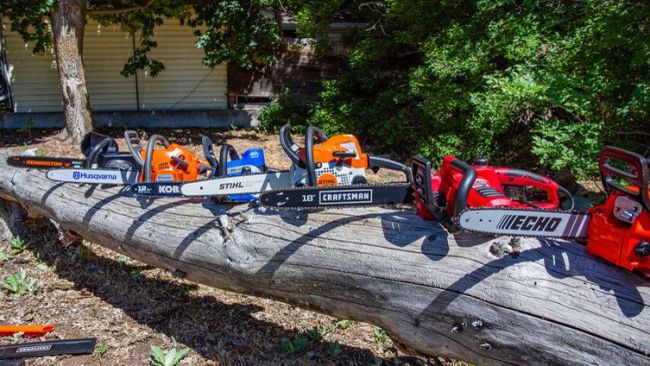
Trying to pick out the best chainsaw? You're in the right place. We tested all the models listed in this guide to help you choose.
Unlike the best hedge trimmers, chainsaws are like their bigger, meaner cousins. Using a revolving chain and fuel, they can cut through overgrown foliage, tree trunks, and thickets. You don't know where to start with so many chainsaws out there. We compared several models based on power, safety, build quality, and fuel type.
The main difference between chainsaws is whether they're gas or electric. Gas models are generally more robust, making them great for more significant tasks but also heavier. There are cordless and corded electric chainsaws, and you'll have to decide based on how long you'll need to use them. Cordless models have to be recharged.
A chainsaw's bar (also called the blade) is also different lengths, and the longer the bar, the better it is for cutting trees.
In this guide, we have reviewed all eight chainsaws. I tested them for brush, pre-cut logs, and old trees for at least two weeks. I have considered price, availability, design, and performance. I have even noted the maintenance requirements for battery-powered and gas-powered chainsaws so you can get a feel for the tool.

Alex Temblador, an award-winning Dallas-based author and freelance writer, curated this guide to the best chainsaws. She has covered home, design, architecture, and art for various publications. Recently, she bought a 103-year-old Sears & Roebuck house with a wraparound porch and original features. She also enjoys testing products for buying guides and reviews while embracing her first-time homeowner life.
The quick list
Below, we’ve provided an overview of the important details you need to know about each product immediately so you can buy quickly if you're in a hurry. If something catches your eye, use the links to delve deeper into the analysis provided for each product further down the page.
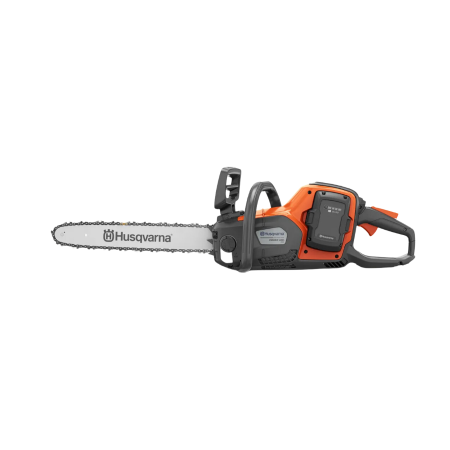
The best chainsaw overall
The Husqvarna Power Axe 350i is a powerful battery-powered chainsaw with a boost mode that can cut through a tree nearly a foot and a half in length.
Pros
- Battery-powered
- Has a boost mode
- Multiple safety elements
- Powerful chainsaw can cut large trees and limbs
Cons
- Fairly heavy
- Doesn’t include oil
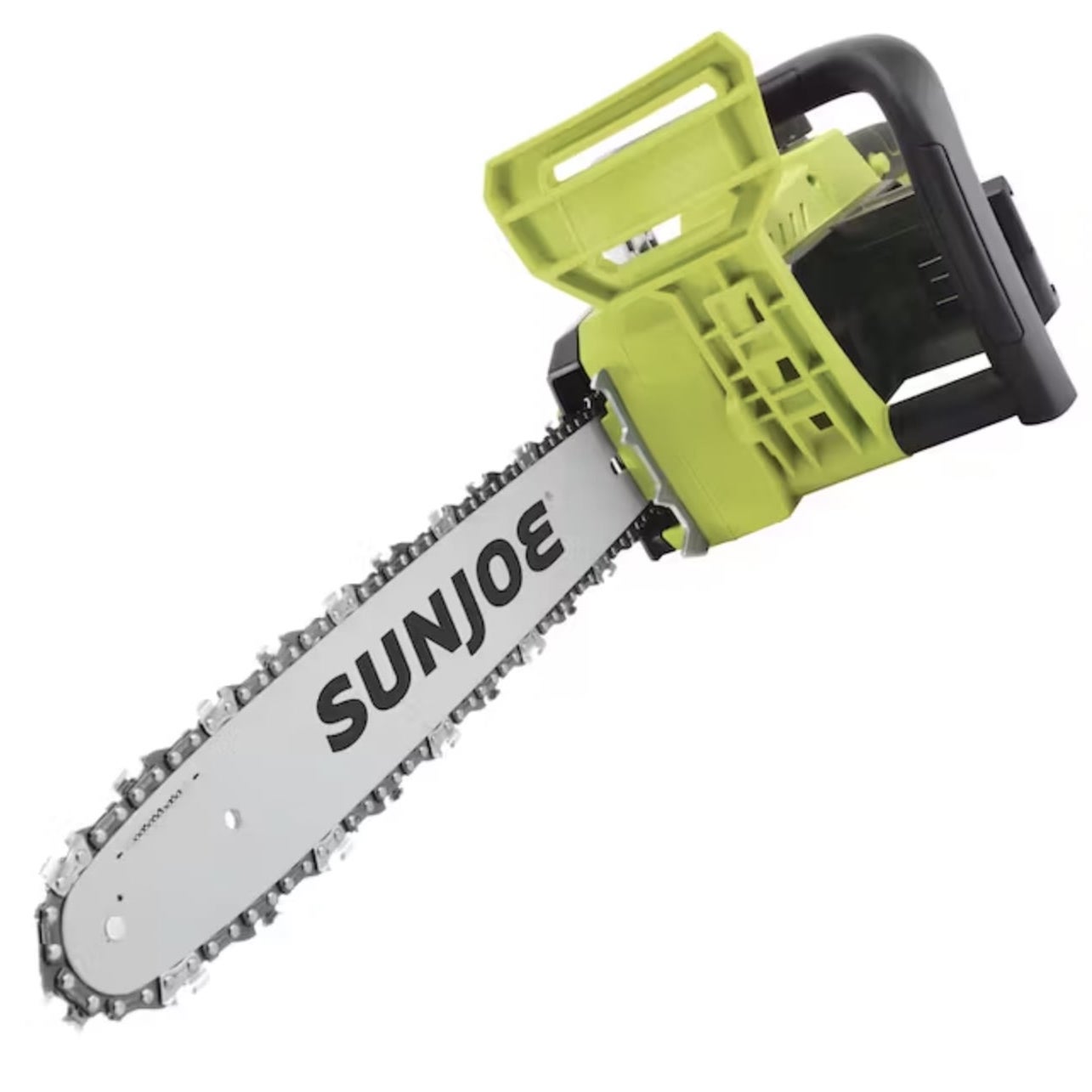
The best inexpensive chainsaw
The Sun Joe 24V-X2-CS16 48-Volt IONMAX Cordless Chain Saw is a beginner-friendly chainsaw with a 15-inch bar, great for pruning.
Pros
- Lightweight
- Oil level is visible
- Some good safety features
- Two batteries that equal 48 volts
- No tools needed to tighten chain
Cons
- No boost mode
- May not be as comfortable to use for left-handed people
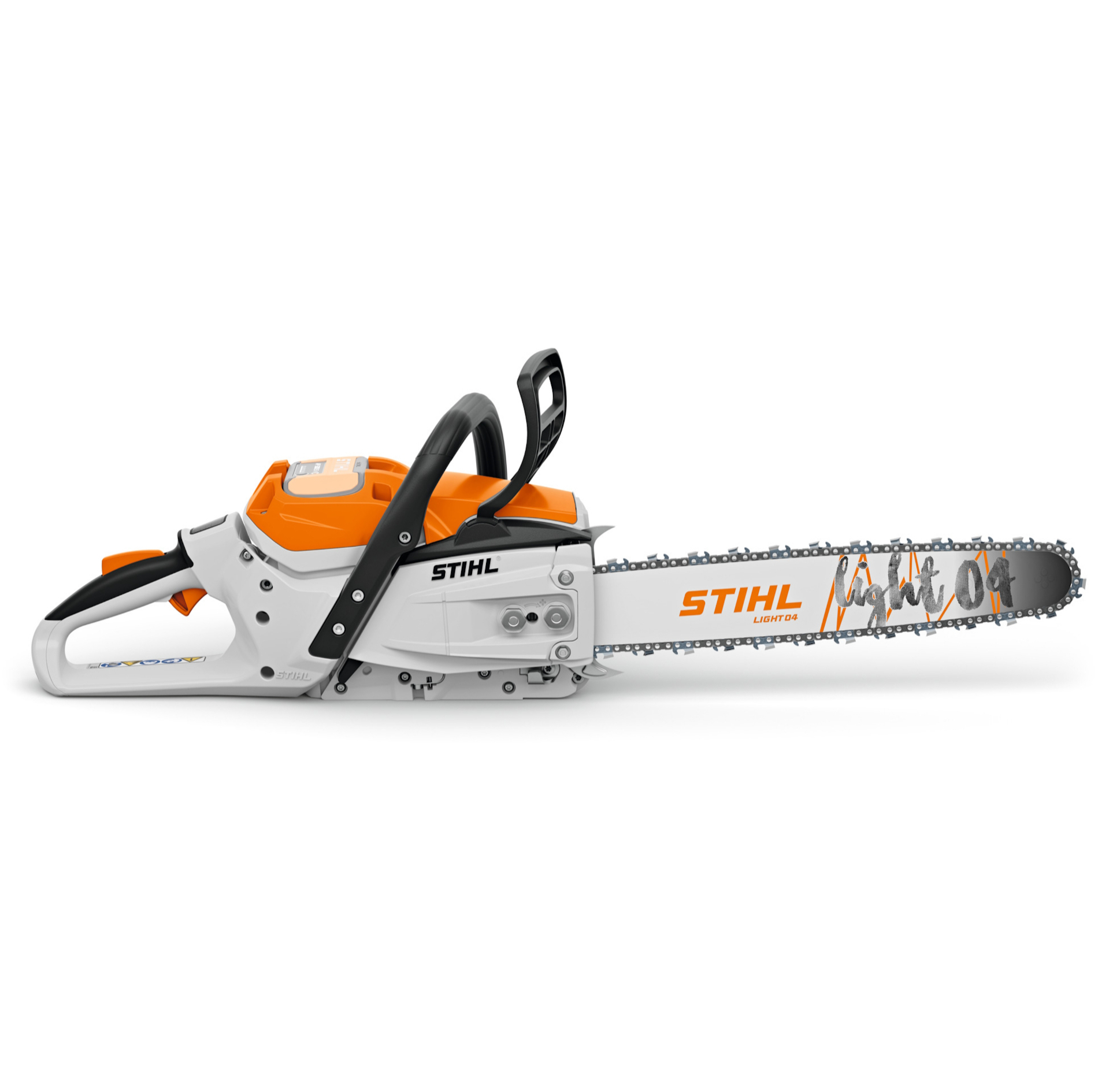
The best premium chainsaw
STIHL's MSA 300 C chainsaw is lightweight, has a long battery life, and has variable speed. It's ideal for homeowners who have small to medium tree-cutting tasks.
Load the next products ↴
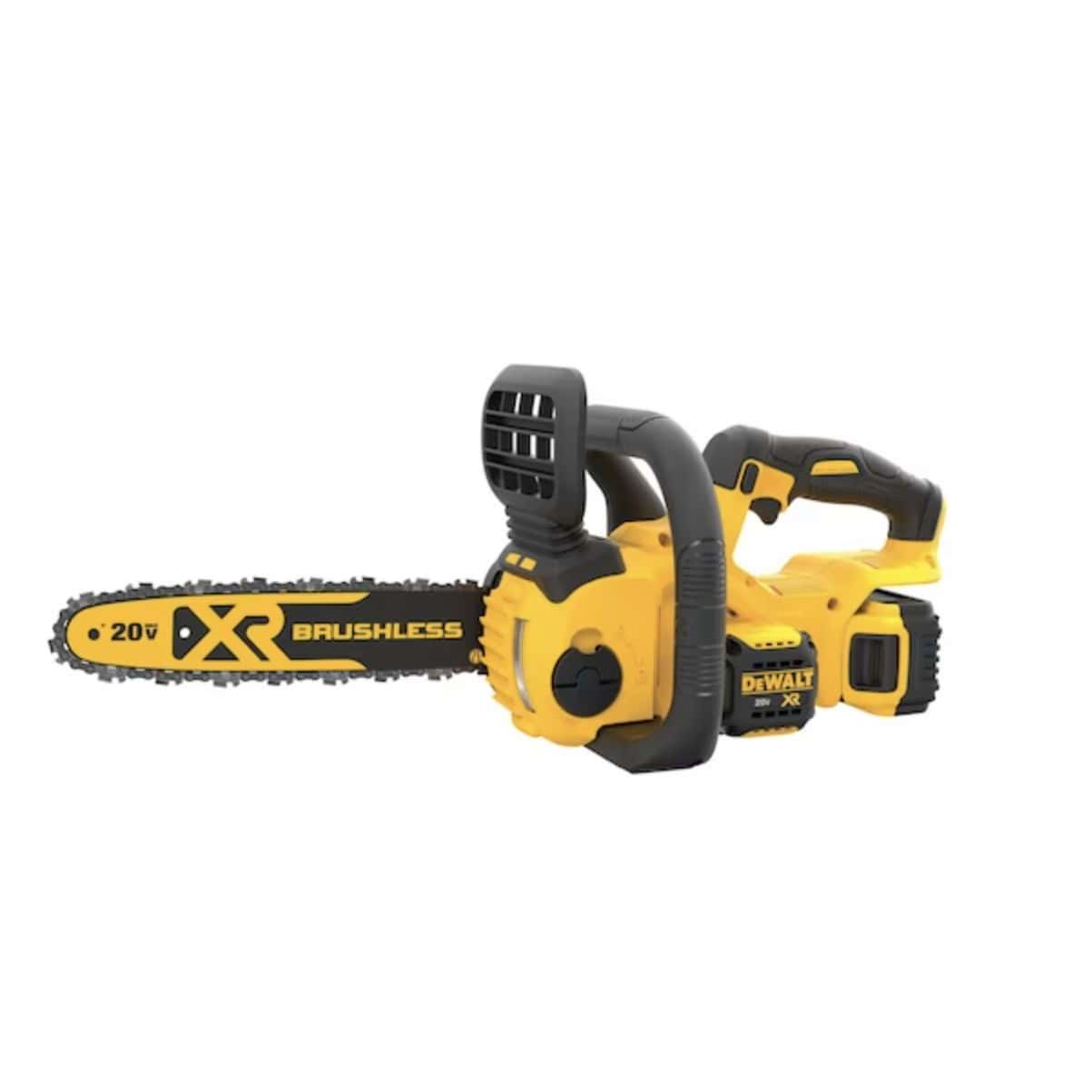
The best chainsaw for small jobs
The DeWalt 20V MAX XR DCCS620P1 Battery Chainsaw can cut through limbs and trees less than a foot in diameter. With safety features and a lightweight build, it’s a good entry-level option for small jobs.
Pros
- Lightweight
- Oil level is visible
- Built-in chain tension tool
- Some good safety features
Cons
- Not as well-suited to left-handed individuals
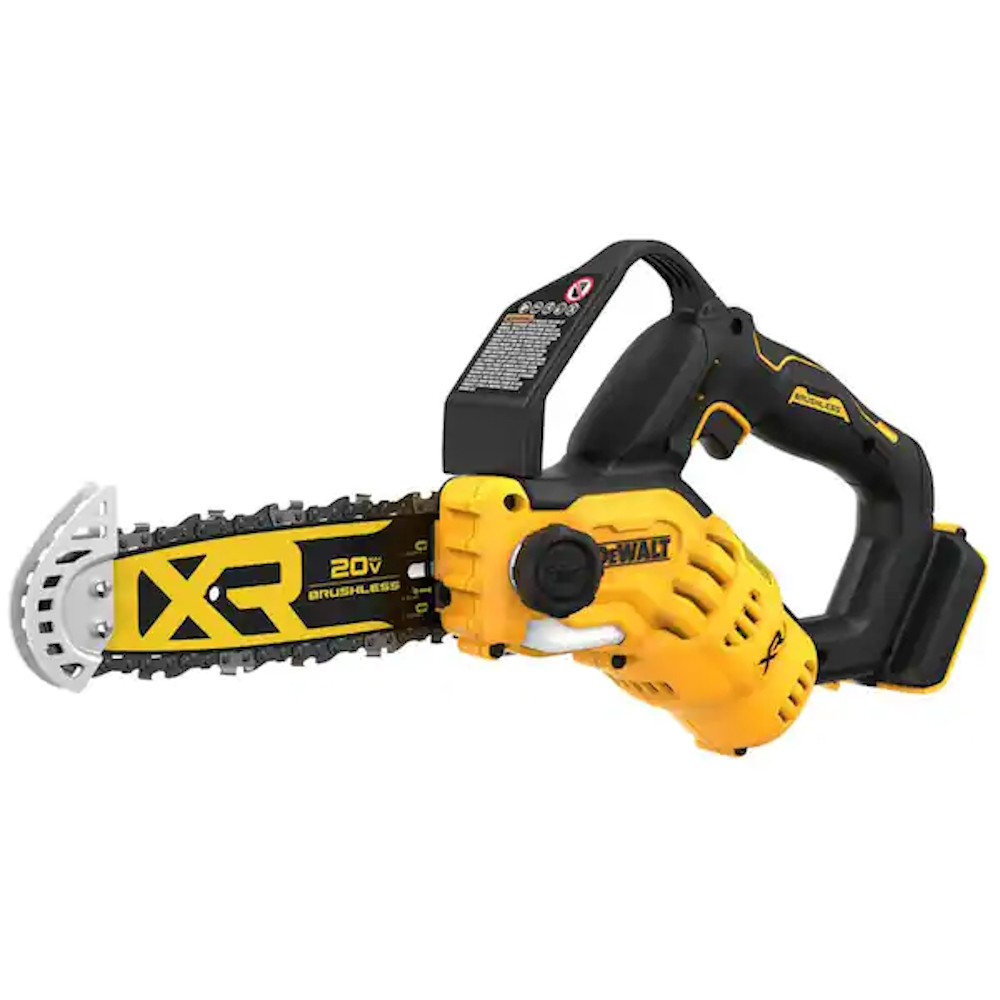
The best mini chainsaw
Weighing less than 9 lbs and suitable for cutting small trees, limbs, and logs quickly and smoothly, this DeWALT mini chainsaw is perfect for small jobs around the yard. While it doesn't have a kickback brake, it does have a tip guard and a two-handed trigger system as a safety feature.
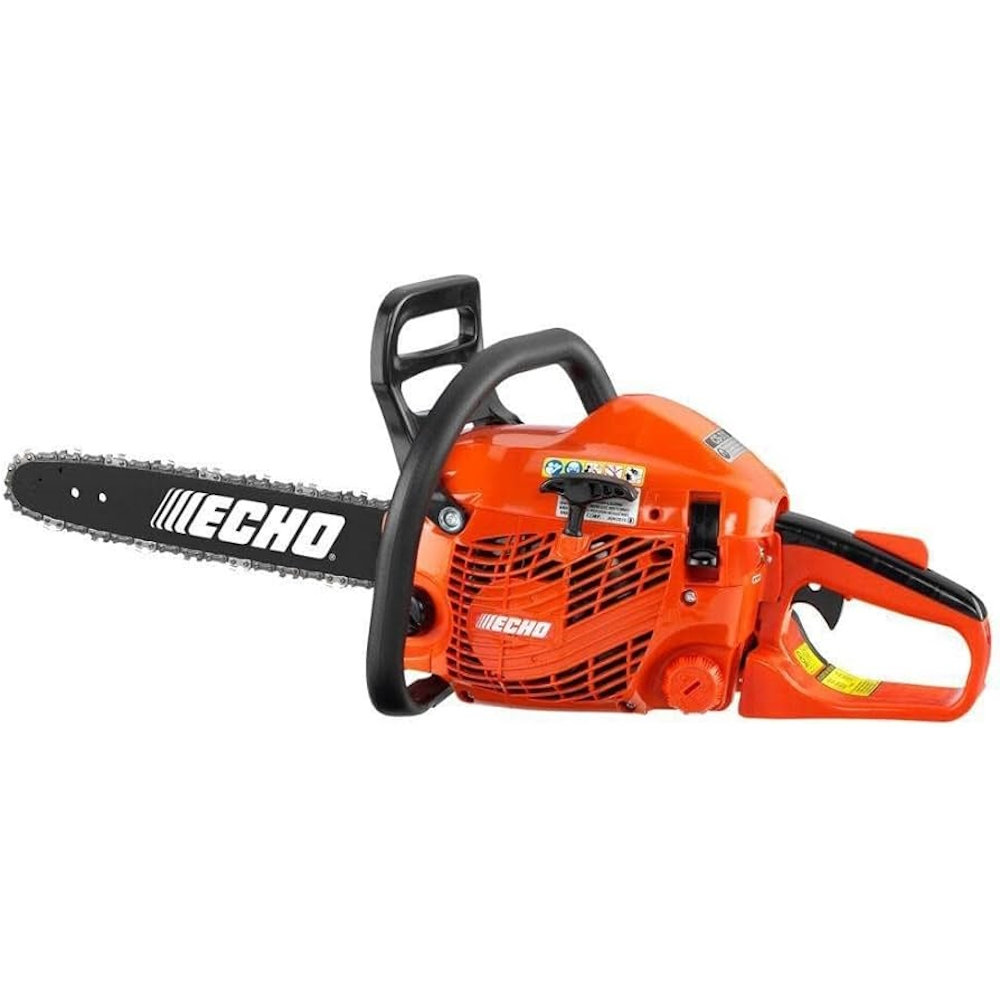
The best gas-powered chainsaw
The Echo CS-310-14 is a gas-powered chainsaw that is a great choice if you’re regularly doing garden maintenance.
Pros
- Light
- Well balanced
- Provides clean cut
Cons
- Overkill for home users
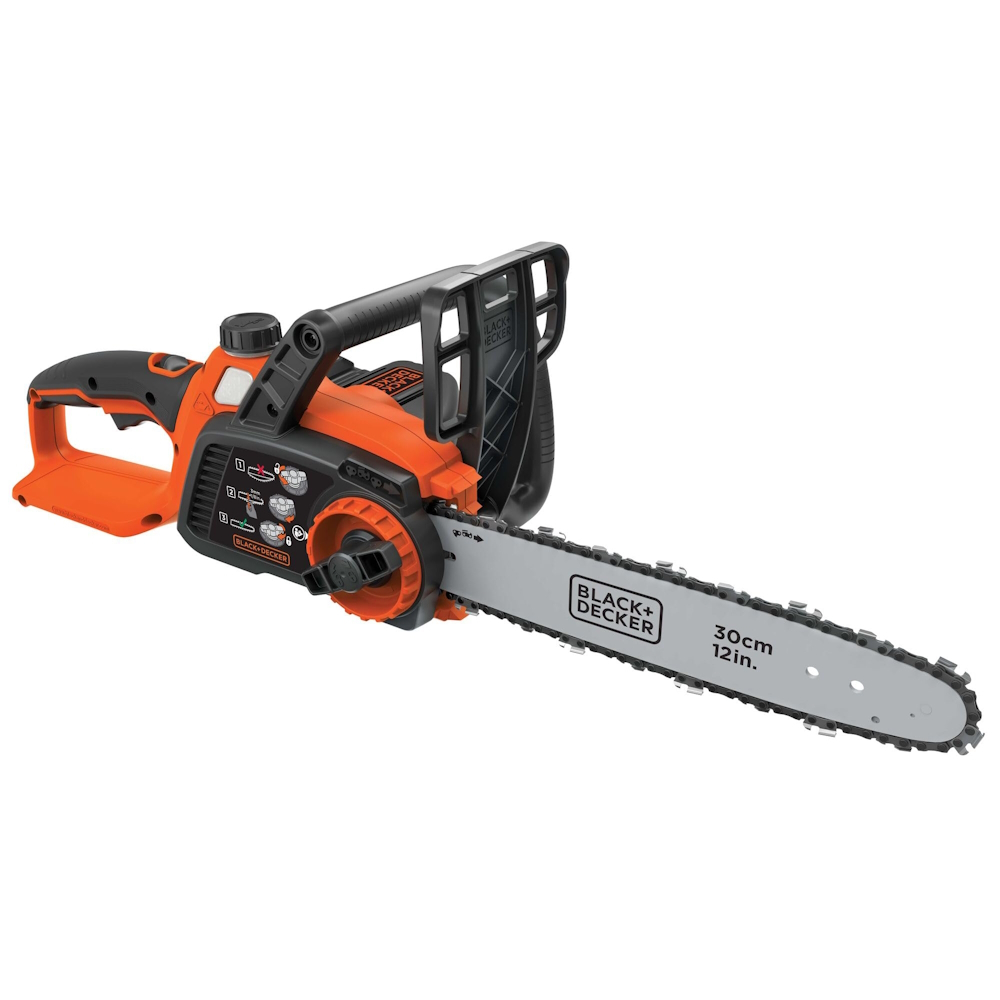
The best lightweight chainsaw
For trees and limbs less than 12 inches, the BLACK + DECKER 40V Max 12-inch Cordless Chainsaw will do the trick. The lightweight chainsaw is smooth and easy to handle, with a compact build and great safety features.
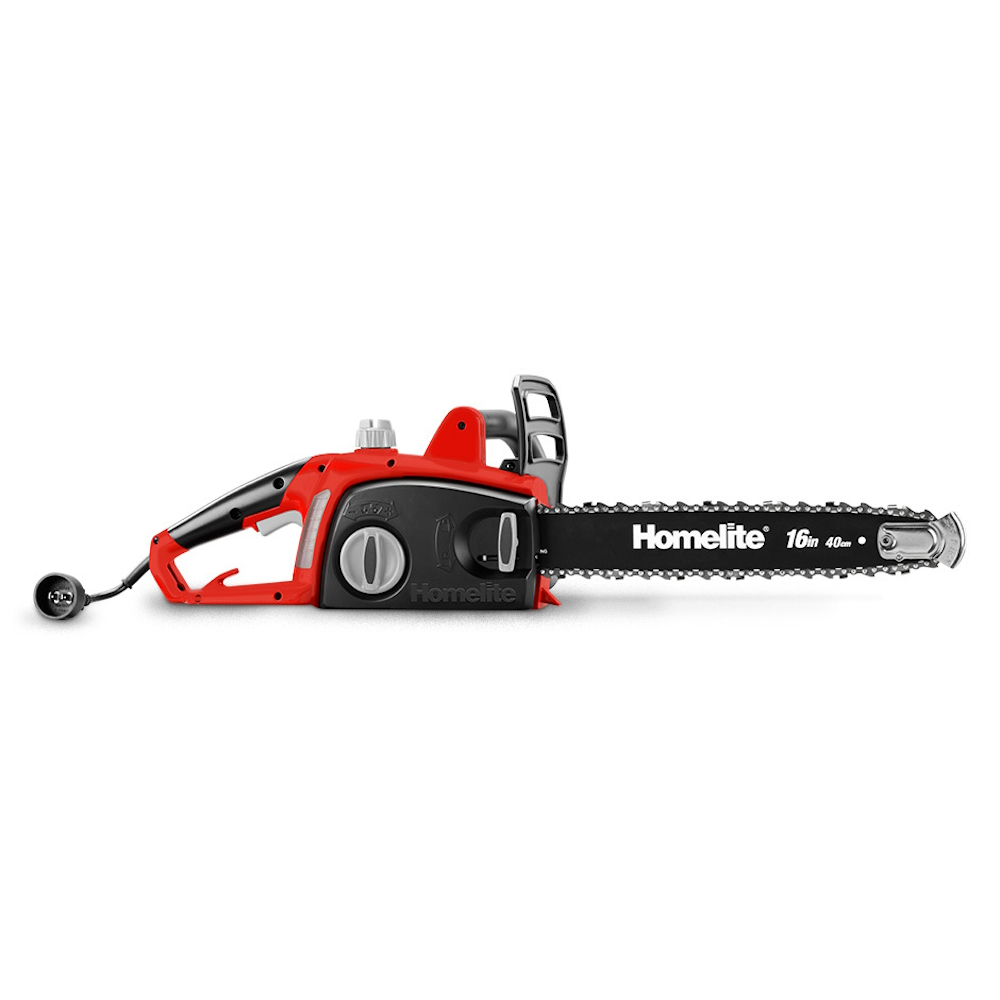
The best beginner chainsaw
The Homelite UT43122B is a well-priced chainsaw that's great for smaller tasks. It's super simple to set up and start working with. It won't do so well with thicker lumber, but it does a decent job at this price of most other tasks.
Pros
- Fully assembled, use straight out of the box
- 15-amp motor for powerful cutting action
- 18-inch bar
Cons
- Uses an electric cord
- Less powerful than a gas saw
The best chainsaws we recommend
Why you can trust Top Ten Reviews
Our team has thoroughly reviewed the products featured in our buyer's guides. We strive to provide comprehensive and unbiased rankings based on our hands-on testing and expert research. Our evaluations consider top-rated brands and essential features to assist you in making informed purchasing decisions at the best value.
The best chainsaw overall
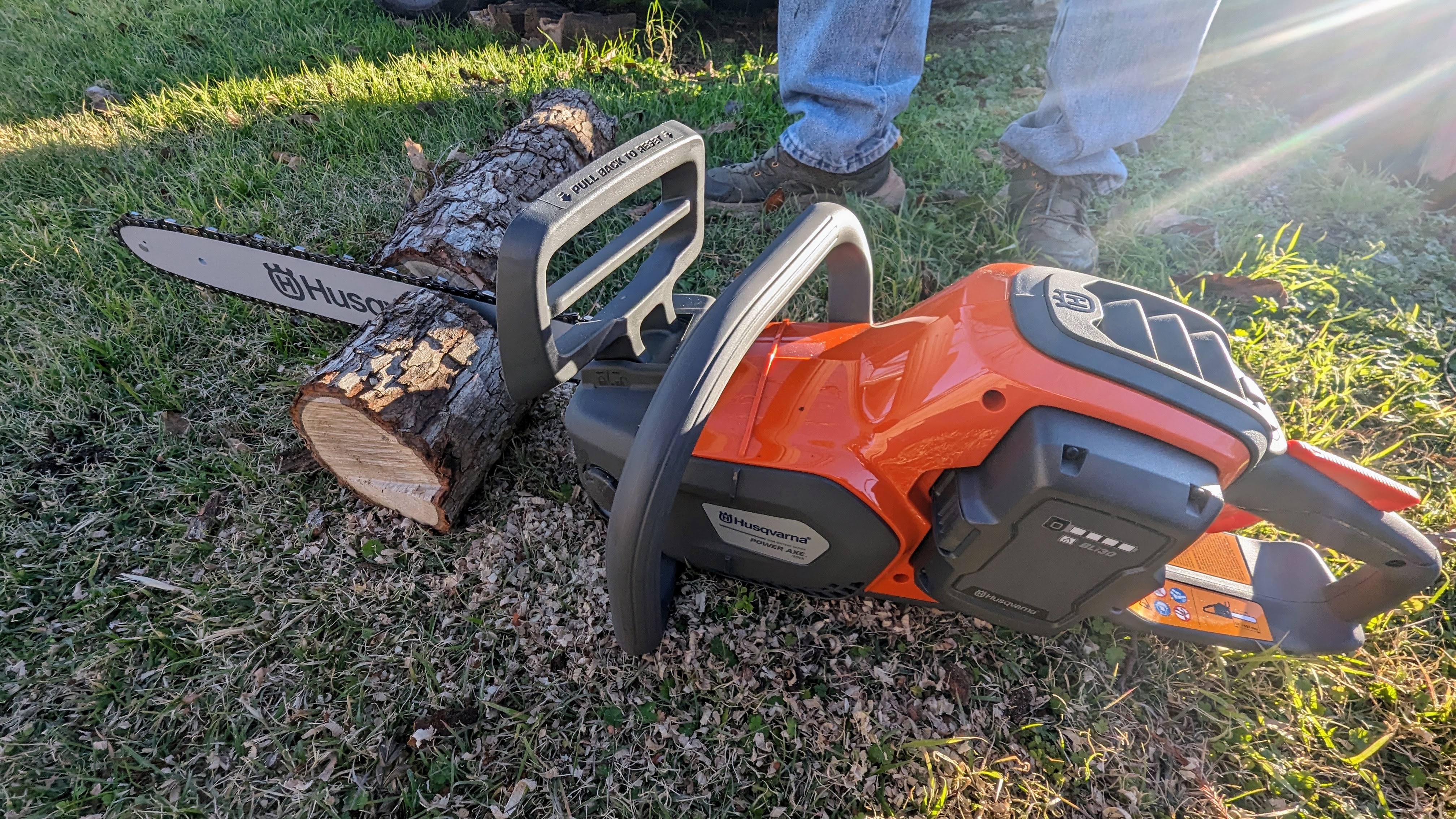
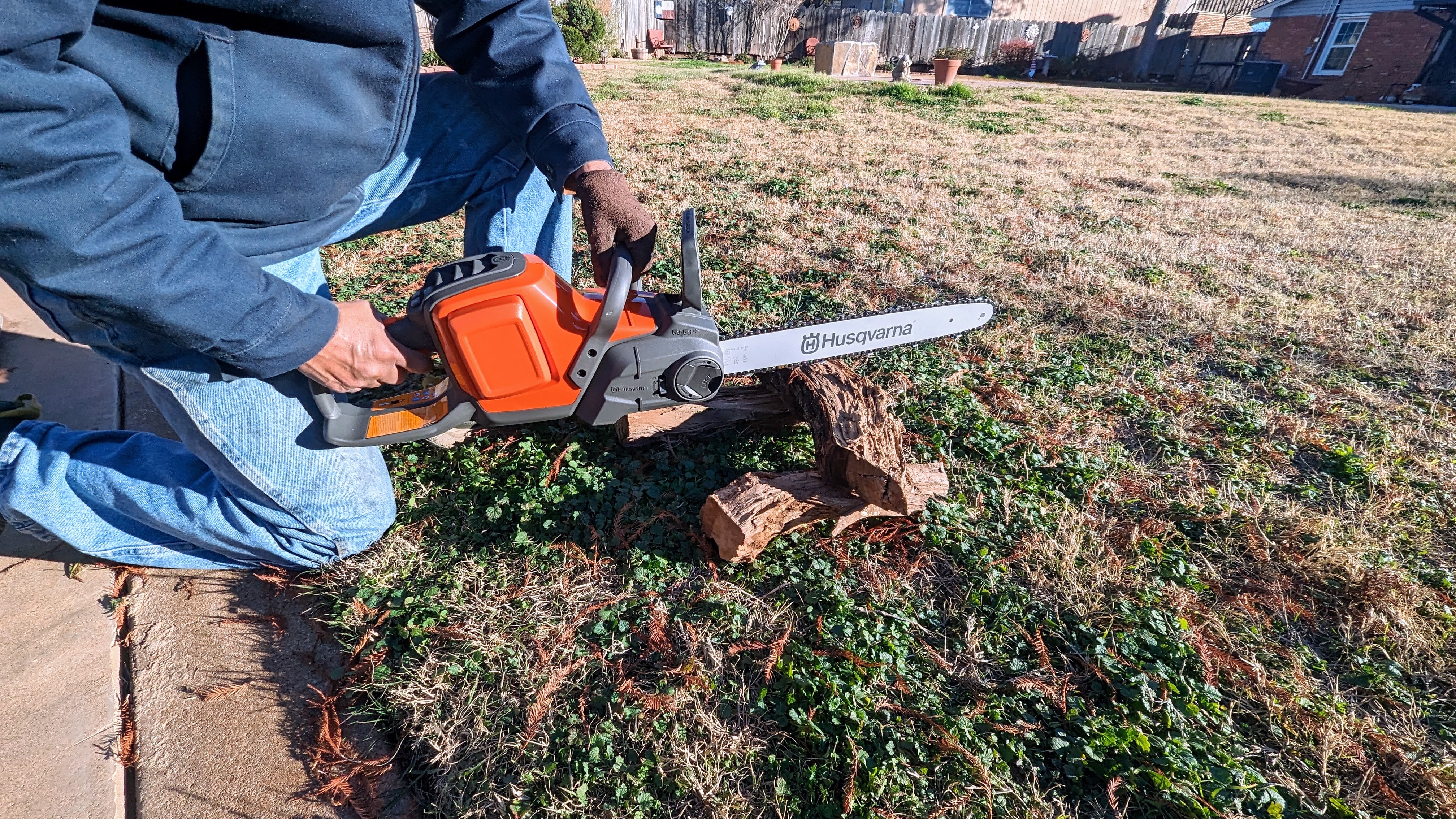
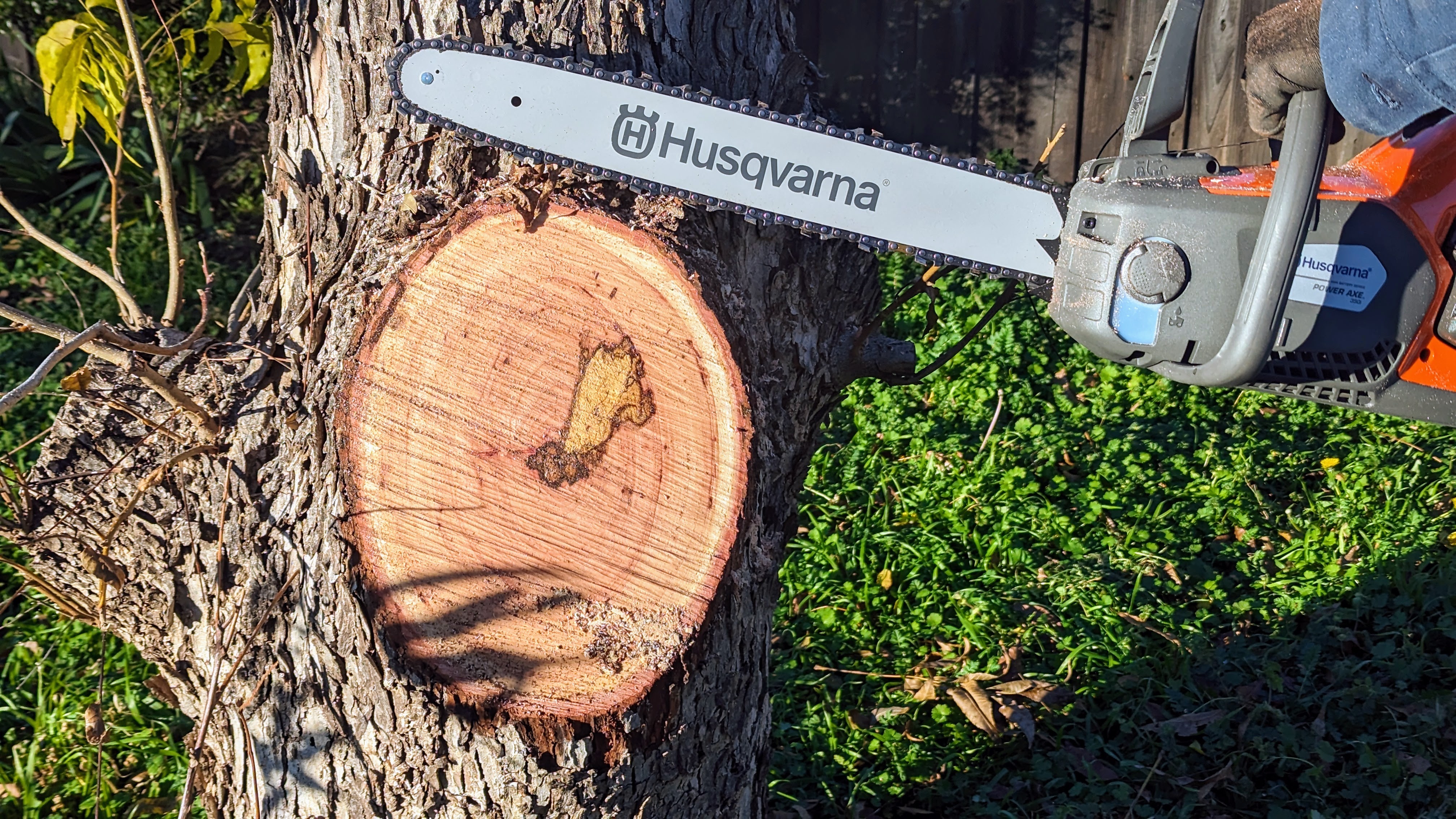
Specifications
Reasons to buy
Reasons to avoid
Husqvarna's Power Axe 350i Cordless Electric Chainsaw shows off the power of battery-powered tools. With this 18-inch chainsaw, trees nearly a foot and a half in diameter can be easily trimmed. Despite its weight, the boost mode lets you cut quickly, making it a good replacement for gas-powered chainsaws. It's easy to start thanks to its battery operation, and it's got several safety features.
When I got the fully assembled Husqvarna Power Axe 350i, I noticed it performed really well with the included 40V battery. But chain oil wasn't included, so I had to buy it separately. Regardless, it worked great.
An 18-inch bar and an S93G chain with a convenient side tension mechanism make this chainsaw safe. Filling the oil chamber requires tilting it, but using a funnel minimizes spills. Starting the chainsaw requires pressing two triggers, and the chain brake stops movement during kickback. Due to the added weight from the battery, the two-handed operation is safer. In boost mode, the cutting speed increases significantly, but regular mode is fine for most jobs, saving battery life.
I tested the Husqvarna Power Axe 350i in my yard and with my parents and was impressed with its ability to cut through small and medium logs with ease. It also worked great on thicker, older limbs. The battery still showed over 50% charge after two 30-minute sessions, so it worked really well. I felt safe using it thanks to its thoughtful design, which included well-placed handles, a chain brake for safety, and a bar cover for easy storage.
Read more: Husqvarna Power Axe 350i Cordless Electric Chainsaw review

Husqvarna is proving to everyone that a battery-powered chainsaw is not less effective than a gas-driven one with their Power Axe 350i Cordless Electric Chainsaw. This 18-inch heavy-duty chainsaw can cut through a tree nearly a foot and a half in length. It's heavy, but you’ll cut through trees quickly, thanks to a boost mode. Powered by a battery, you can start it up quickly, plus enjoy some helpful safety features.
| Attributes | Notes | Rating |
|---|---|---|
| Features | Packed with safety features and offers a helpful boost mode. | ★★★★★ |
| Performance | Cuts smoothly, efficiently and quickly. | ★★★★★ |
| Value | For $479.99, it's more expensive than other battery-powered offerings. | ★★★★ |
The best inexpensive chainsaw
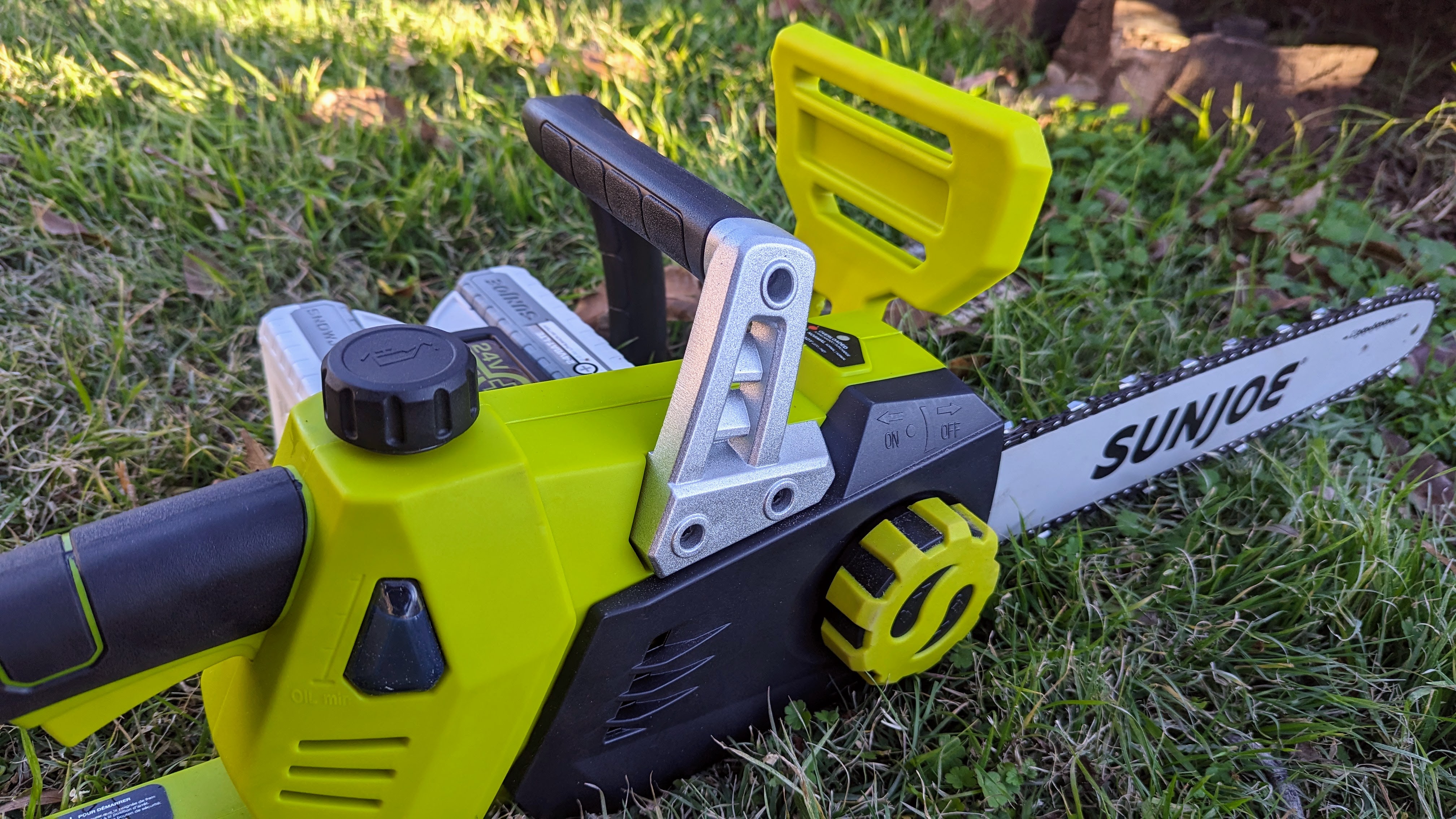
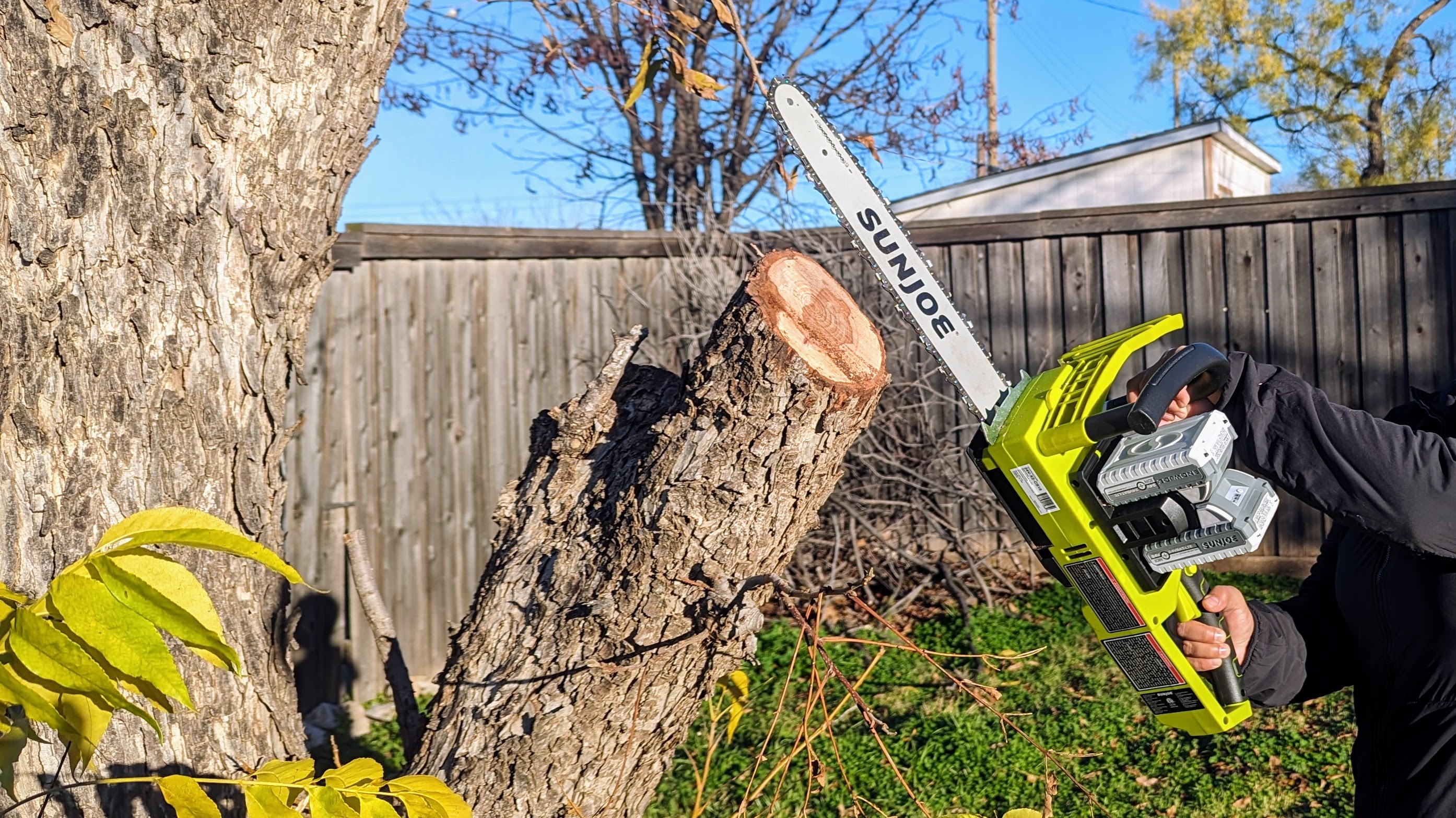
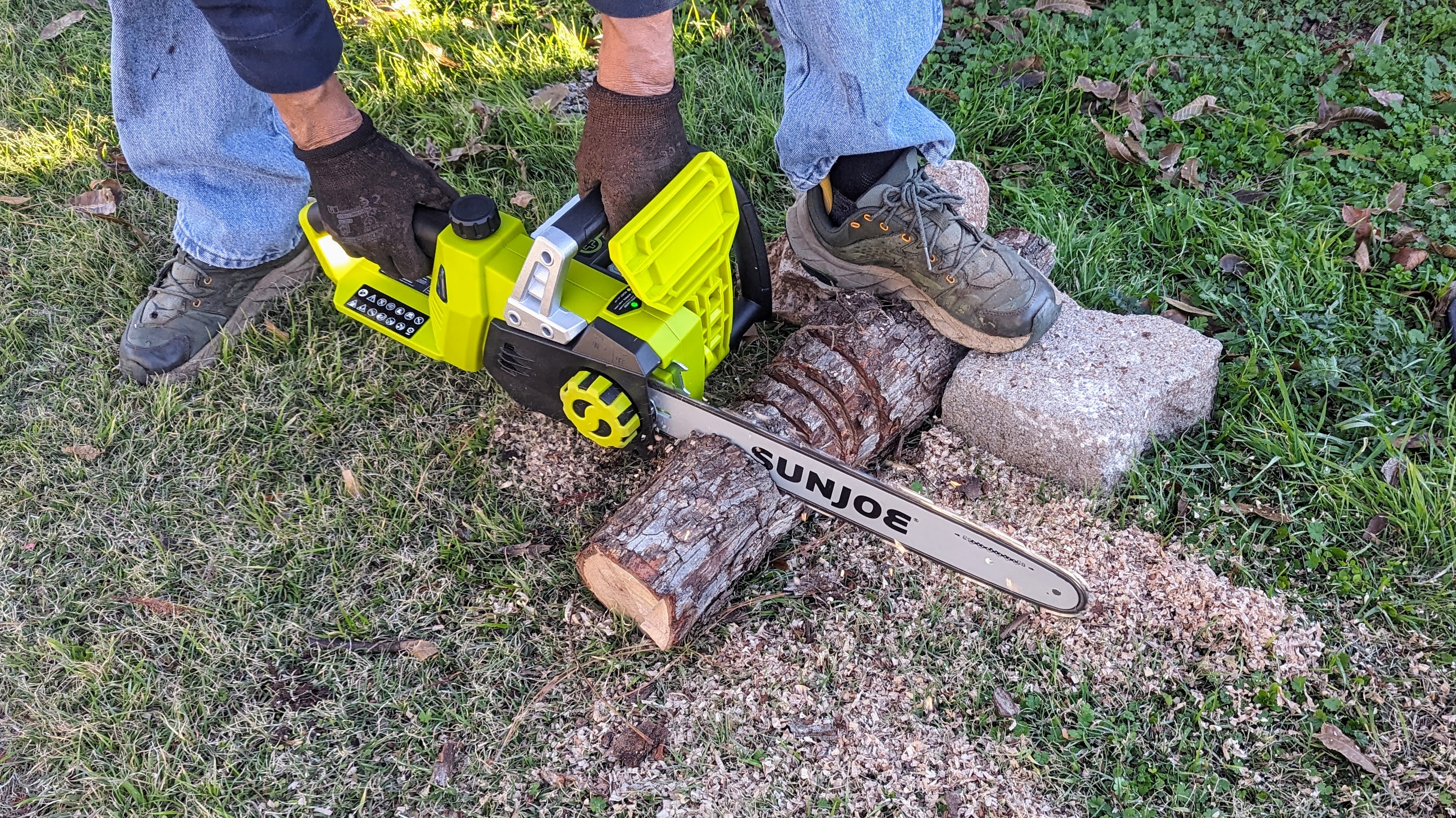
Specifications
Reasons to buy
Reasons to avoid
You might like the Sun Joe 24V-X2-CS16 48-Volt IONMAX Cordless Chain Saw if you're new to chainsaws. It's cheap and easy to use and requires no tools to assemble. This 16-inch bar can handle limbs up to 15.5 inches in diameter, so it's perfect for those who want to prune rather than cut down big trees.
The saw arrived fully assembled and came with a protective cover. I've tested Sun Joe products before, so I knew its lime green design. It's lightweight and easy to adjust without any tools, but I'd have preferred a single battery setup for greater power.
Sun Joe 24V-X2-CS16 comes with two 24-volt batteries on the side, an oil cap on top, and an indicator window on top. It has a built-in tension mechanism for quick adjustments and a two-handle design that makes it easy to handle, especially for people with the right hands. Indicator lights tell you when the saw's ready to go, and a chain brake activates during kickback.
After starting with smaller logs, I gradually moved up to bigger ones. The setup was easy, and the saw started right away, offering a comfortable experience with minimal vibration. It cut through limbs well, but it moved a little slower compared to a 40V single-battery model. But that's not a big deal for most homeowners. In addition, it's quiet at 86dB, making it the least noisy option I reviewed, and it's easy to store.
Read more: Sun Joe 24V-X2-CS16 48-Volt IONMAX Cordless Chain Saw review

Never used a chainsaw? Check out the Sun Joe 24V-X2-CS16 48-Volt IONMAX Cordless Chain Saw. Batteries power this well-priced chainsaw and don’t require any tools for assembly or use. With a 16-inch bar, you can cut through 15.5-inch limbs, which is great for most homeowners who aren’t looking to fall trees in their yard but just need something for pruning jobs here and there.
| Attributes | Notes | Rating |
|---|---|---|
| Features | Lightweight, quiet and easy to use, with a comfortable grip but no boost mode. | ★★★★ |
| Performance | Not as powerful as other options but performs as expected. | ★★★★ |
| Value | Great value for money but lacks the power you get with more expensive models. | ★★★★ |
The best premium chainsaw
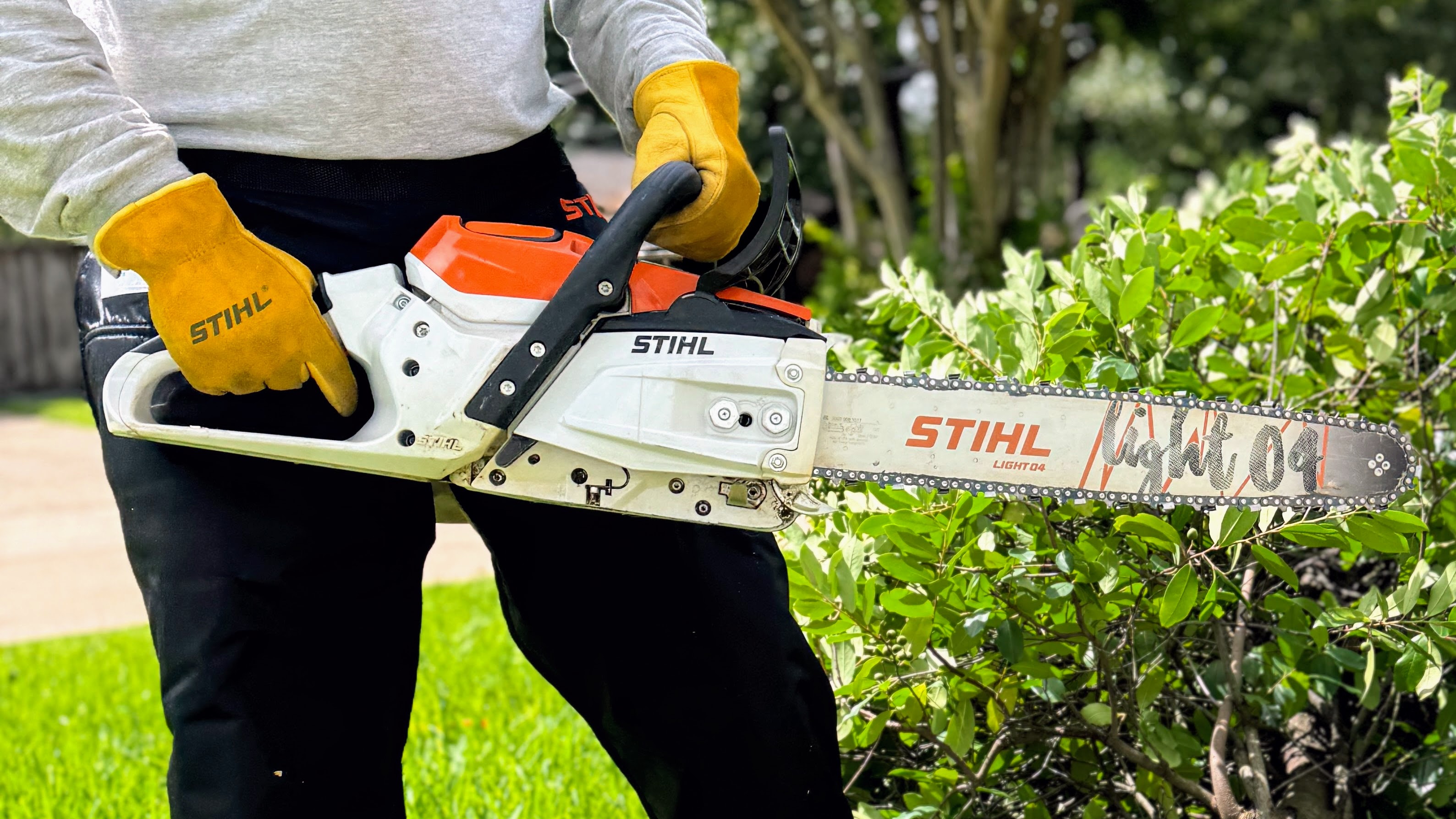
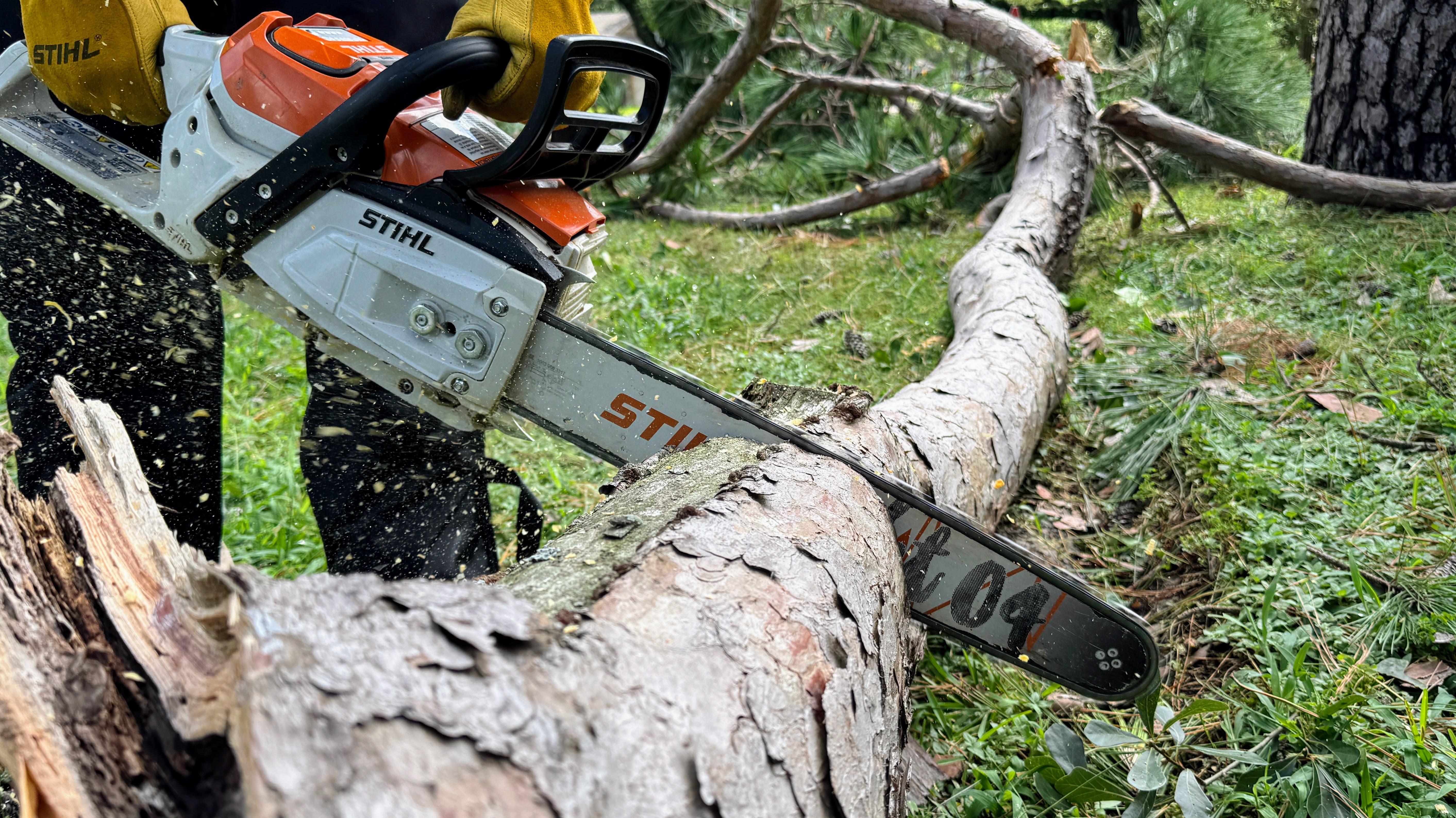
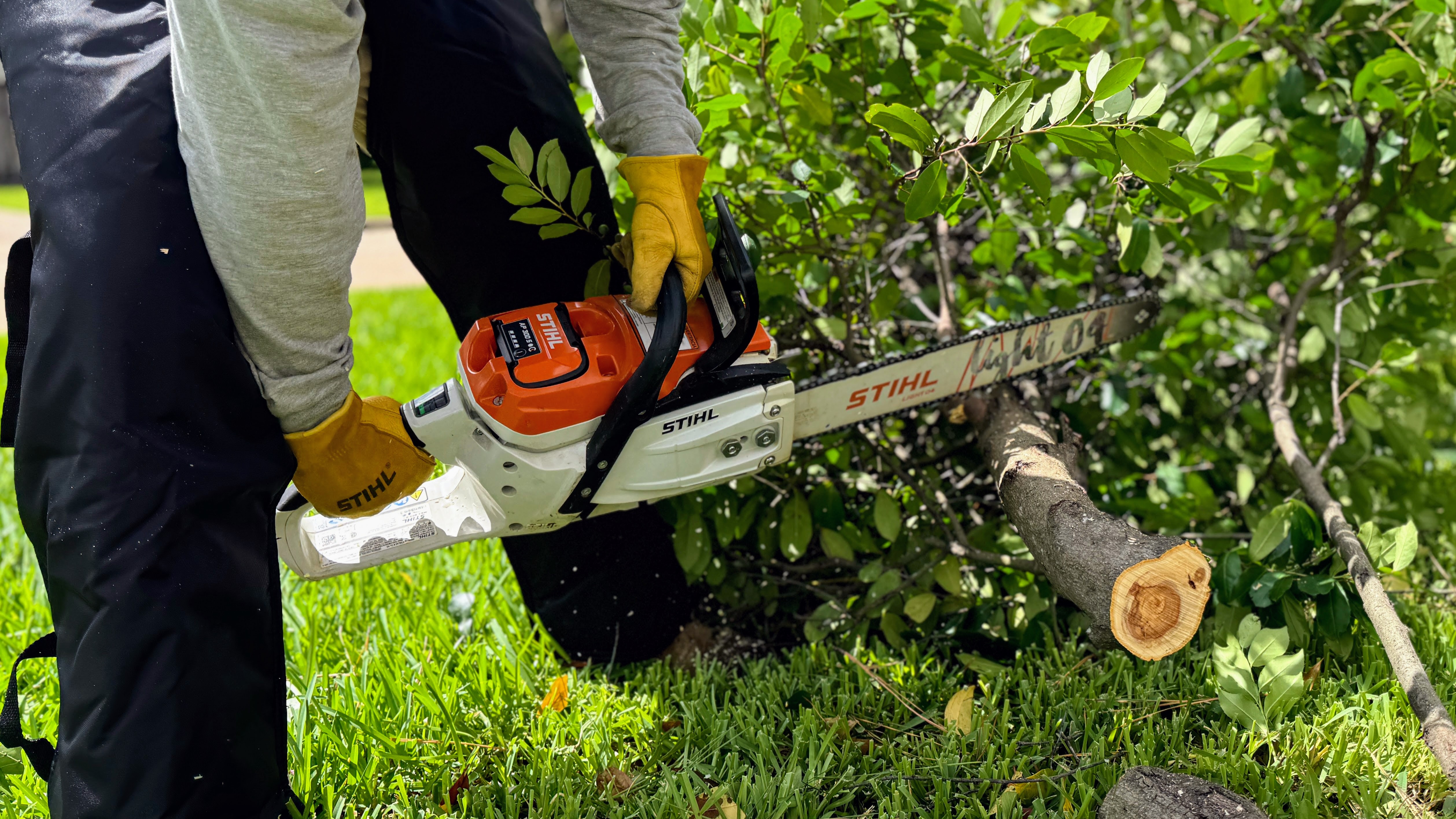
Specifications
Reasons to buy
Reasons to avoid
For homeowners who have medium-sized trees or small branches to trim, the STIHL MSA 300 C chainsaw is a great choice. You can adjust the speed based on your needs, and it has a decent battery life, so you'll get plenty of cutting time. However, its power is somewhat limited, so potential buyers need to find out if it's right for them.
In contrast to most chainsaw unboxing experiences, the MSA 300 C arrives fully assembled. It's easy to set up: Just attach the chain to the bar and tighten it up. Although it's lighter than traditional gas models, its robust construction inspires confidence even right out of the box.
The handle has a trigger, a palm safety release, and a power button that's conveniently located—but left-handed users may find this placement challenging. You can see the saw's status, cutting speed, chain brake, and overheating on an indicator display. A bumper spike stabilizes logs while cutting, so the AP 500 S battery fits comfortably above the handle. With either an 18-inch or 20-inch chain, the 18-inch model weighs a manageable 14.1 pounds with a chain catcher to prevent injury.
In Houston, TX, our reviewer, Jason, dealt with storm-damaged trees. He used the second speed setting first on a foot-thick branch. Although STIHL claims the AP 500 S battery lasts 44 minutes, he got 30 to 35 minutes out of it with a three-hour charge. The 95 dB sound level is way quieter than gas chainsaws.
Read more: STIHL MSA 300 Cordless Chainsaw review

"The STIHL MSA 300 C is a good option for homeowners who have small or medium-sized trees to cut down or need to trim bigger trees. The battery life gives you a good amount of cutting time, and the variable speed is great for adapting to your cutting needs. It’s not quite as powerful as it could be, so you’ll have to decide if it’s enough for you."
| Attribute | Notes | Rating |
|---|---|---|
| Price & availability | It’s a bit more expensive than the nearest competitor and you might have to hunt a bit to find one, but you’re paying for that legendary STIHL reputation. | ★★★★ |
| Design | Well designed and easy to use with a few great extra features. | ★★★★★ |
| Performance | More than powerful enough for most situations. Battery life was a bit lower than expected. | ★★★★½ |
The best chainsaw for small jobs
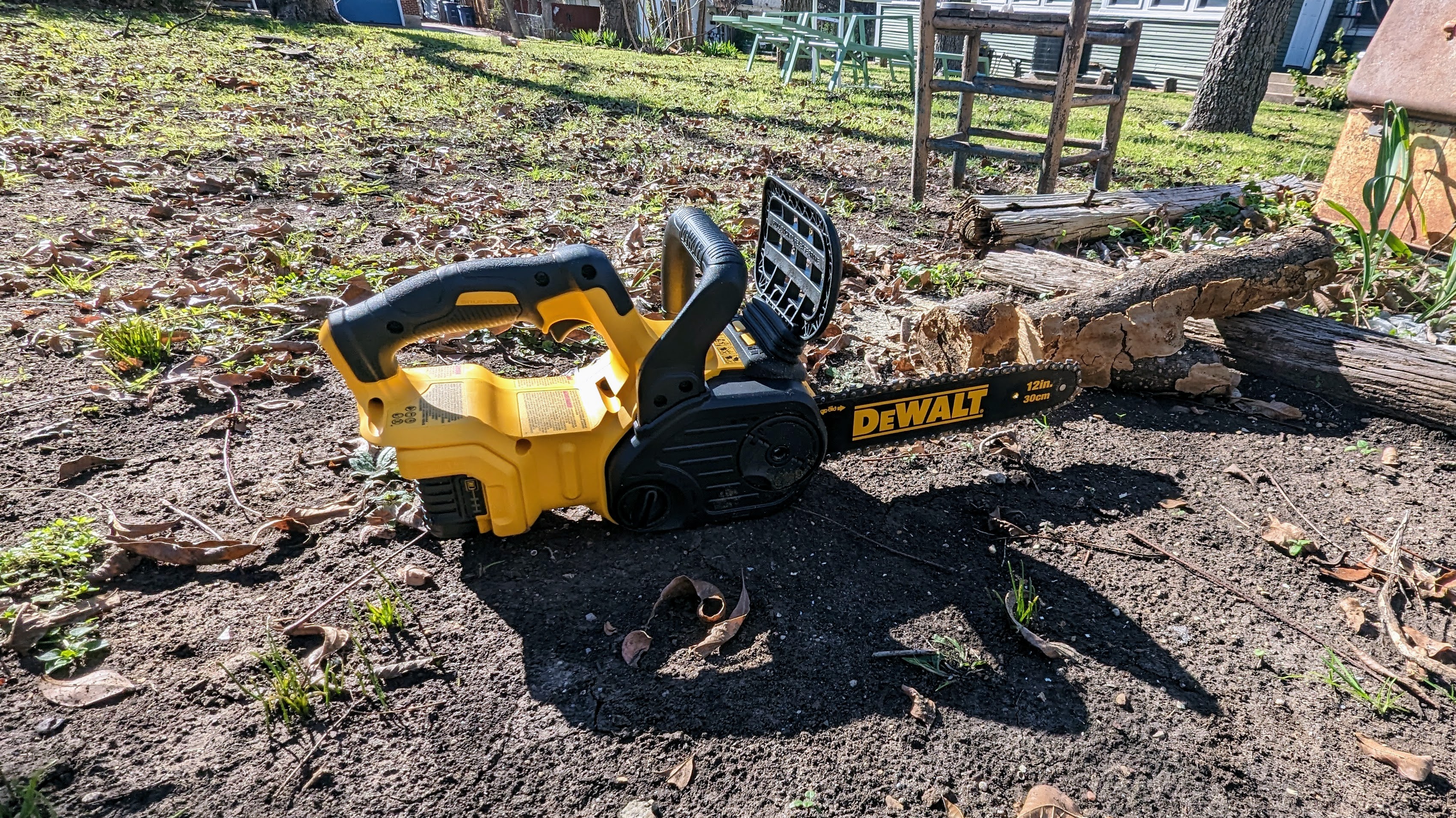
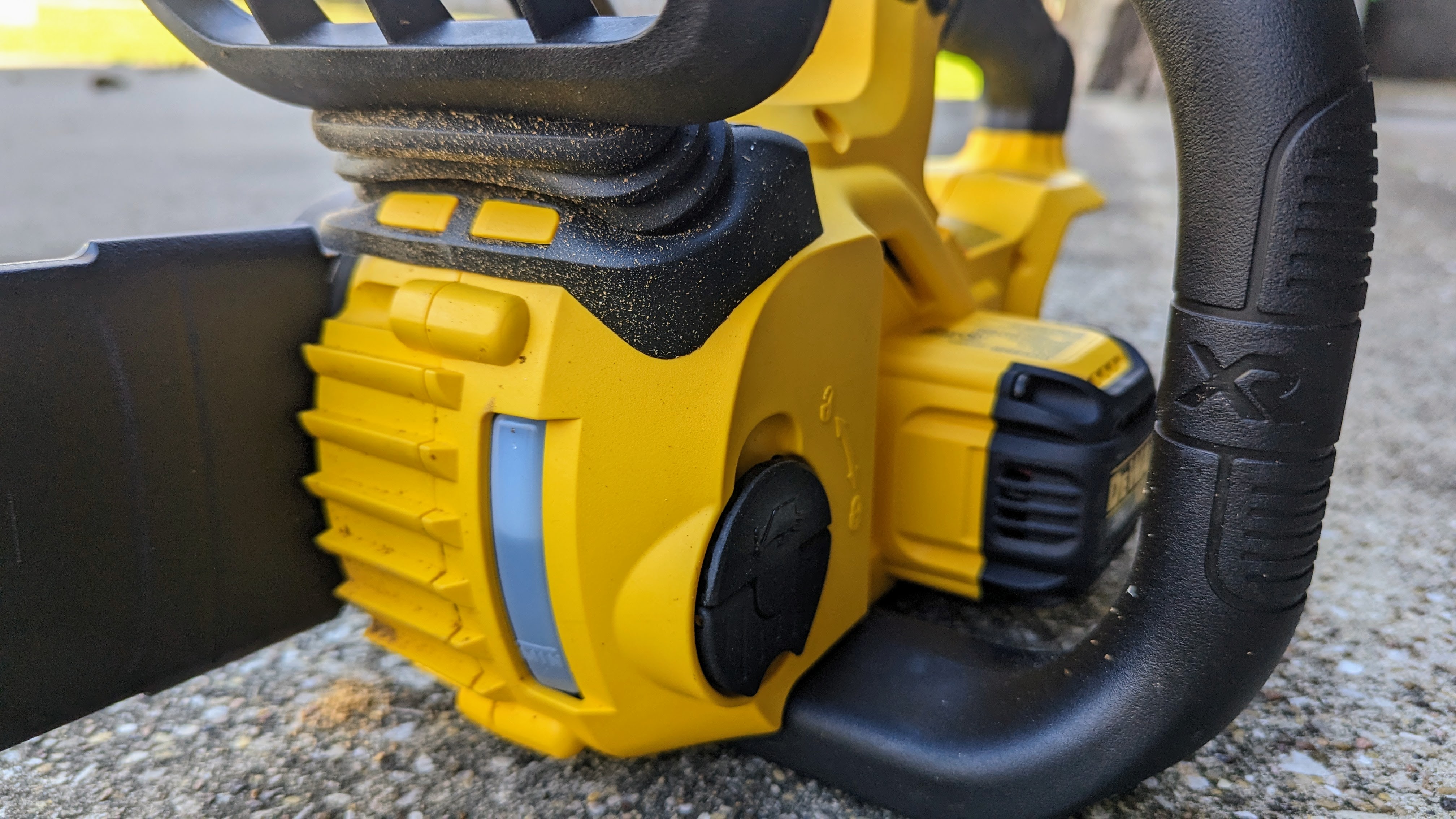
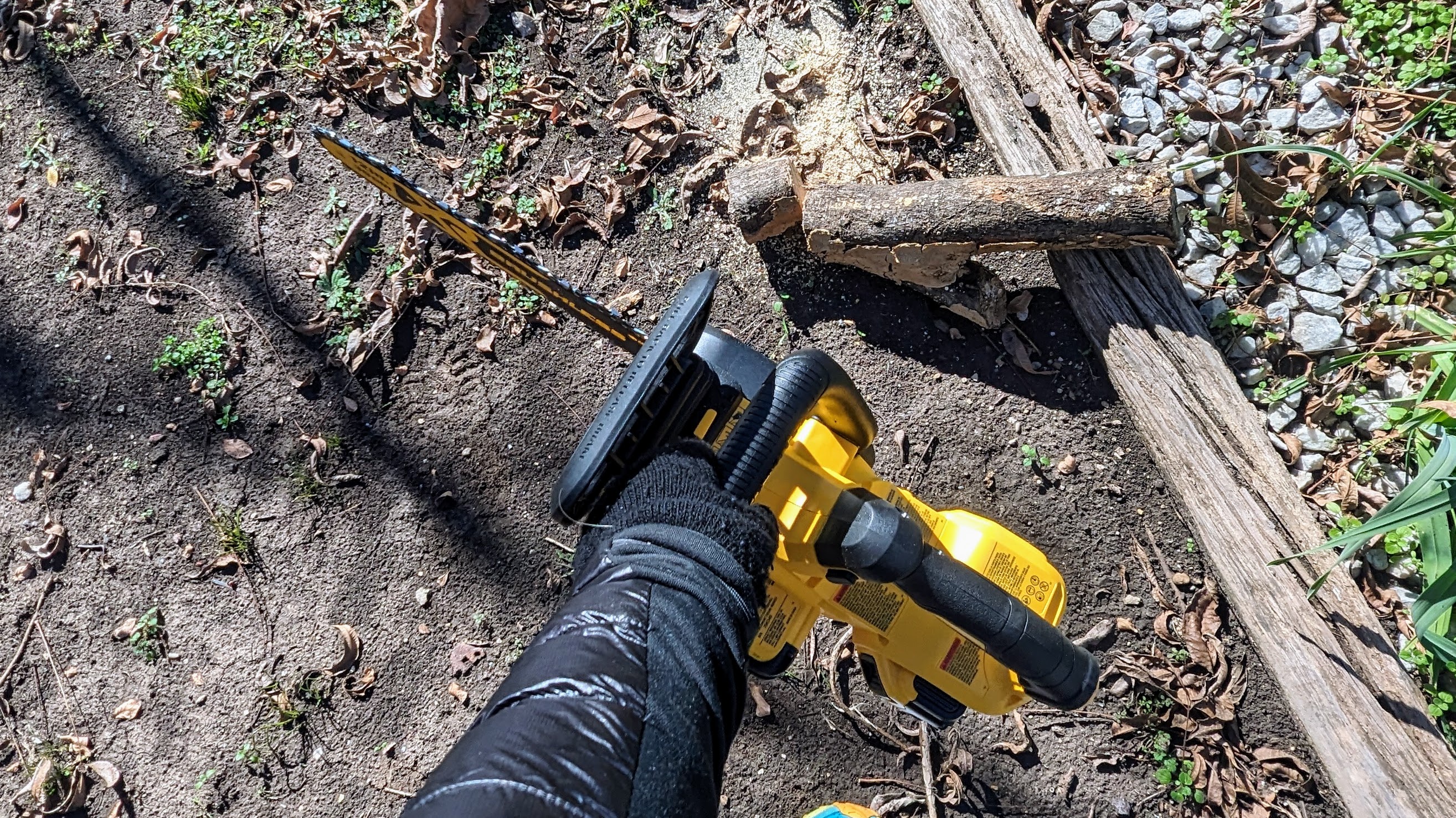
Specifications
Reasons to buy
Reasons to avoid
If you're looking for a reliable chainsaw for light pruning, this DeWalt 20V MAX XR DCCS620P1 is the one for you. Even with a 20V battery, this compact chainsaw cuts trees up to a foot in diameter with impressive power. The design prioritizes safety and ease of use, so it's perfect for beginners.
Recently, I tested the DeWalt 20V MAX XR DCCS620P1, which has a 12-inch bar. It was delivered promptly and required no assembly. All you have to do is charge the battery and add chain oil.
It comes with a cover for safe storage and has a built-in chain tensioner. A clear viewfinder lets you monitor oil levels through the chainsaw's oil compartment. It's easy to fill the oil compartment by laying the chainsaw on its side. It's safe because the battery is under an ergonomic handle that needs to be pressed twice to activate. While the second handle improves control, it is primarily designed for right-handed users, which may cause slight discomfort for left-handed users. The plastic bumper spikes provide some control, but they're not as effective as metal spikes.
During my tests in the backyard, I was impressed with the chainsaw's lightweight design. It handled logs from four to eight inches in diameter seamlessly and proved efficient for pruning. I found it best suited for cutting things about 12 inches in diameter or smaller. This chainsaw is perfect for maintaining your yard because it has low vibration and is just 88dB noisy.
Read more: DeWalt 20V MAX XR DCCS620P1 Battery Chainsaw review

If you don’t need big pruning jobs, stick with the DeWalt 20V MAX XR DCCS620P1 Battery Chainsaw. Although it’s only equipped with a 20V battery, this DeWalt chainsaw uses solid power when cutting limbs, trees, and trunks less than a foot in diameter. Safety features and a lightweight design make it an excellent choice for those new to handling small yard work projects.
| Attributes | Notes | Rating |
|---|---|---|
| Features | Very lightweight and compact chainsaw but it has a small battery. | ★★★★ |
| Performance | Good for small jobs but not cut out for bigger yard work. | ★★★★ |
| Value | Cheaper options are available with similar features and more power. | ★★★ |
The best mini chainsaw
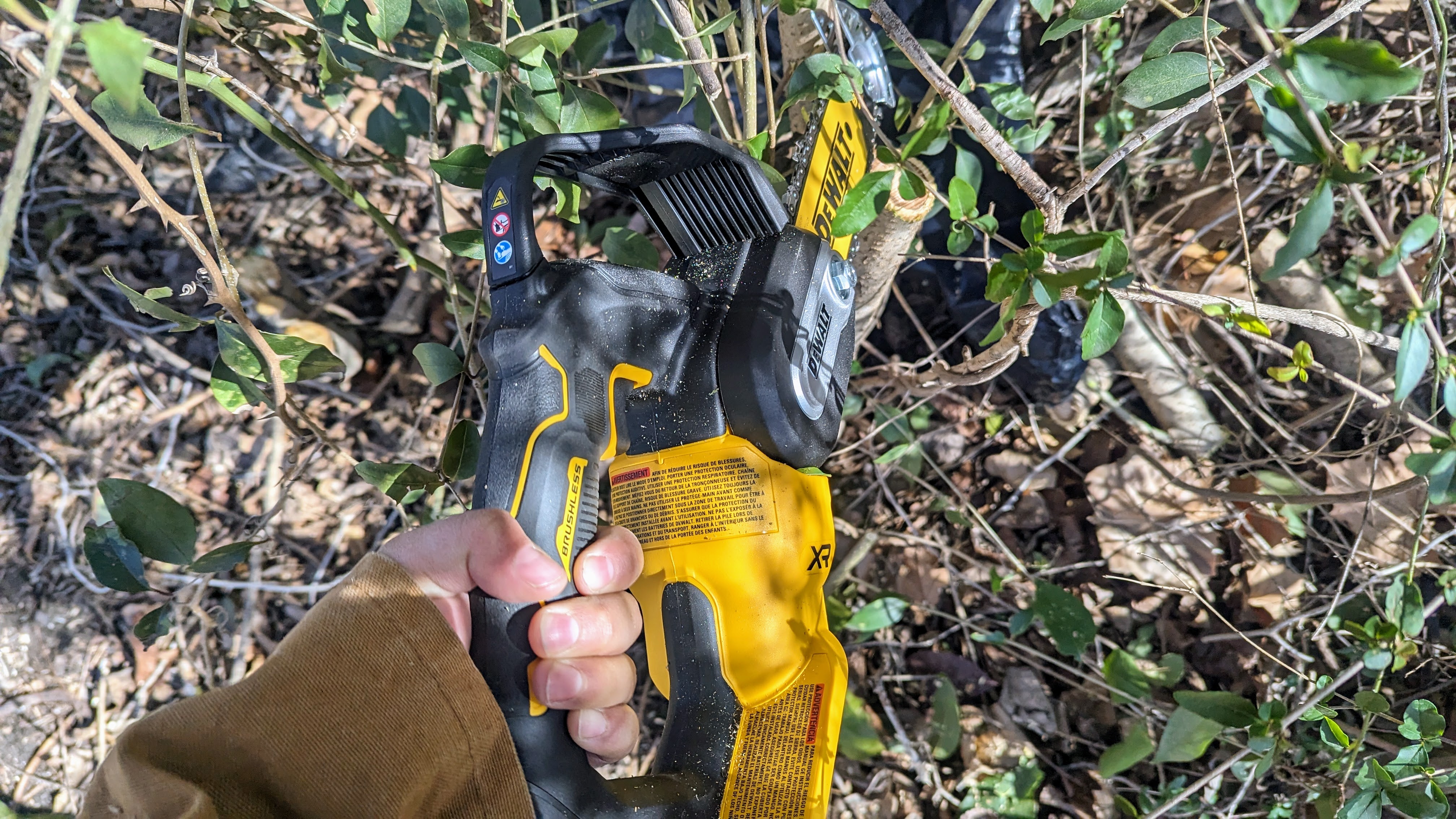
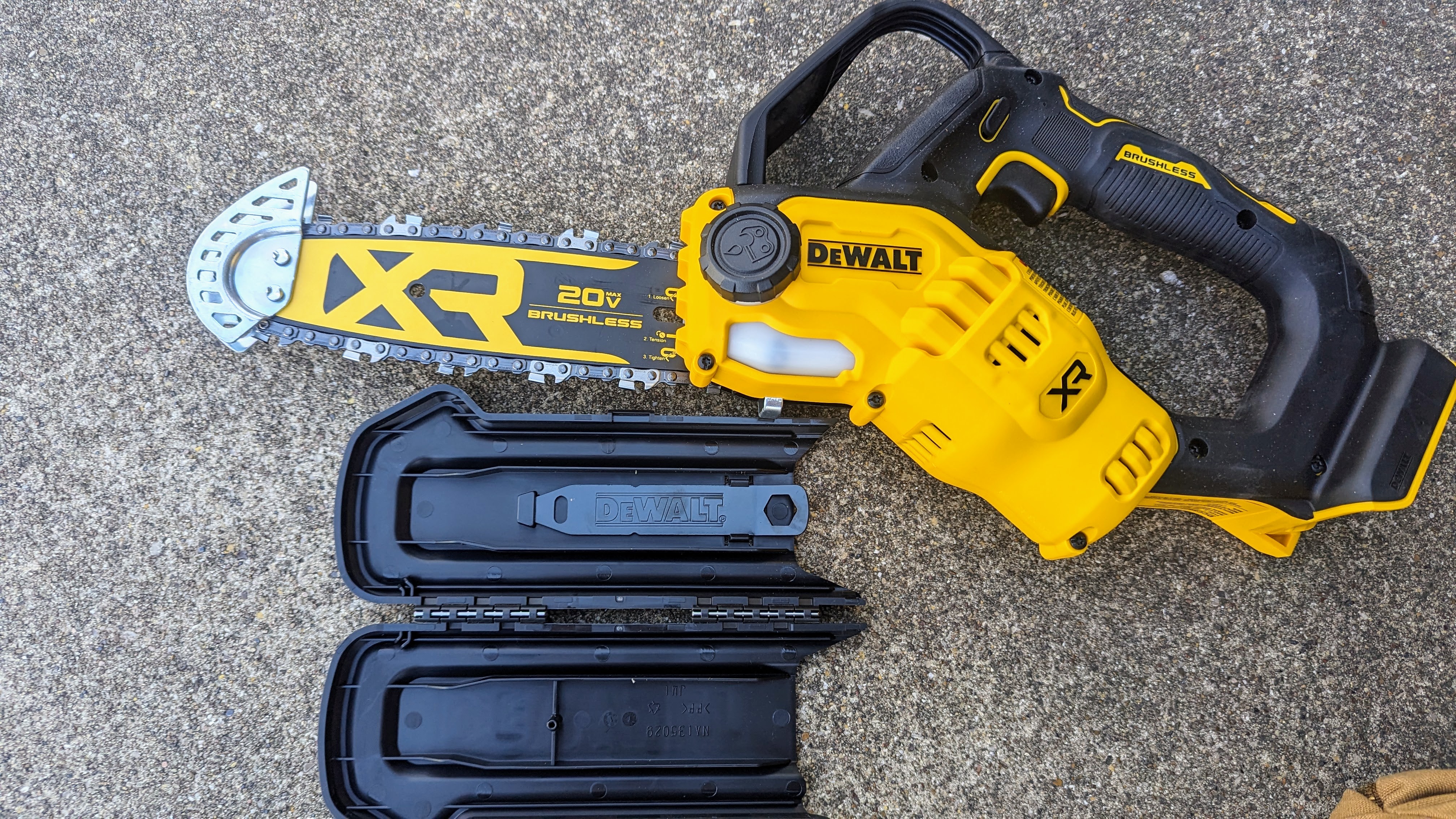
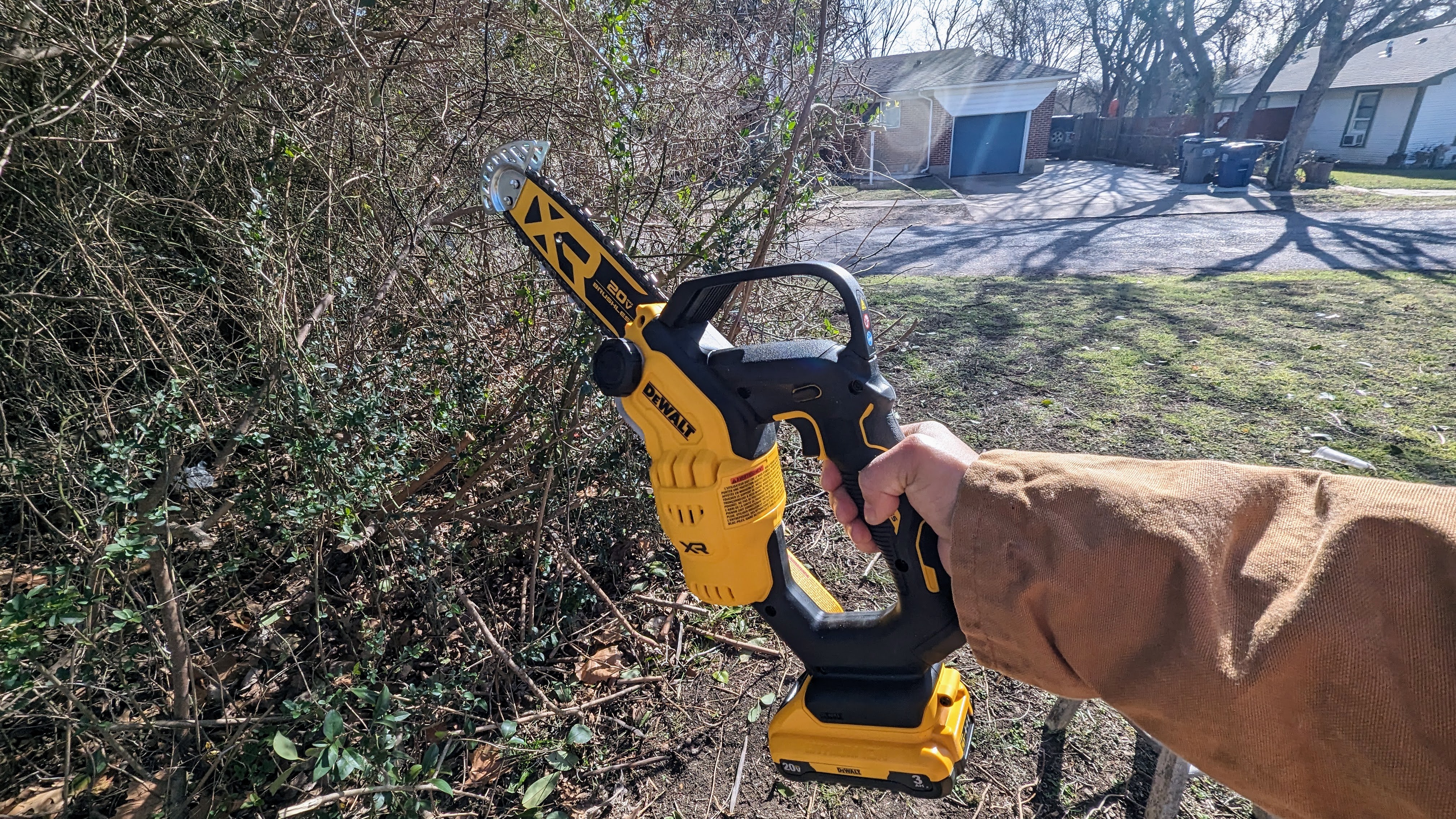
Specifications
Reasons to buy
Reasons to avoid
Despite being less than 9 lbs, the DeWalt 20V MAX 8 in Brushless Cordless Pruning Chainsaw delivers substantial power while ensuring smooth, effortless cuts. Thanks to its 20V battery, it's ideal for small yard work. There's an auto-oiling chain bar so you can cut logs, trees, and branches up to 8 inches in diameter. The chainsaw doesn't have a kickback brake and might be hard for lefties to use, but it has a tip guard and a two-handed trigger.
Upon unboxing, I appreciated the compact design of this pruning chainsaw, which comes fully assembled. Due to its weight and trigger placement, it requires two hands. While the battery charged in about three hours, it didn't come with oil, so I used my own. The chainsaw's design has a comfortable hand grip, but it's tough for left-handed people to use the trigger and button at the same time. It has a secondary handle above the main grip, which helps with stability.
Taking the chainsaw out to my backyard, I tested it on various limbs and logs ranging from 1.5 to 7 inches in diameter. I found the saw to be really good, cutting 4-6 inch branches with ease. When handling larger branches or logs under 8 inches, it worked well with both hands, but the plastic bumper spikes and tip guard didn't obstruct me. In the end, this mini chainsaw proves to be a great choice for quick gardening tasks thanks to its long battery life and seamless cutting, reinforcing my faith in DeWalt.
Read more: DeWalt 20V MAX 8 in. Brushless Cordless Pruning Chainsaw review

The DeWalt 20V MAX 8 in Brushless Cordless Pruning Chainsaw weighs less than 9 lbs. and is the perfect size for small jobs around the yard. Even with a 20V battery, it packs a lot of power and provides smooth and even cuts with little effort on your part. Its auto-oiling chain bar can cut through 8-inch logs, trees, and branches. While it may not have a kickback brake or best suit left-handed folks, it does have a tip guard and a two-handed trigger system for some safe assurances.
| Attribute | Notes | Rating |
|---|---|---|
| Price & availability | Price reflects the brand and performance, but somewhat pricey for a small chainsaw; sold at Amazon, Home Depot, etc. | ★★★★ |
| Design | Mini chainsaw with an 8-inch bar that isn’t suitable to left-handed folks | ★★★★ |
| Performance | Great power output cutting through limbs, trees, and logs less than 8 inches. Better to use two hands to control. | ★★★★ |
The best gas-powered chainsaw
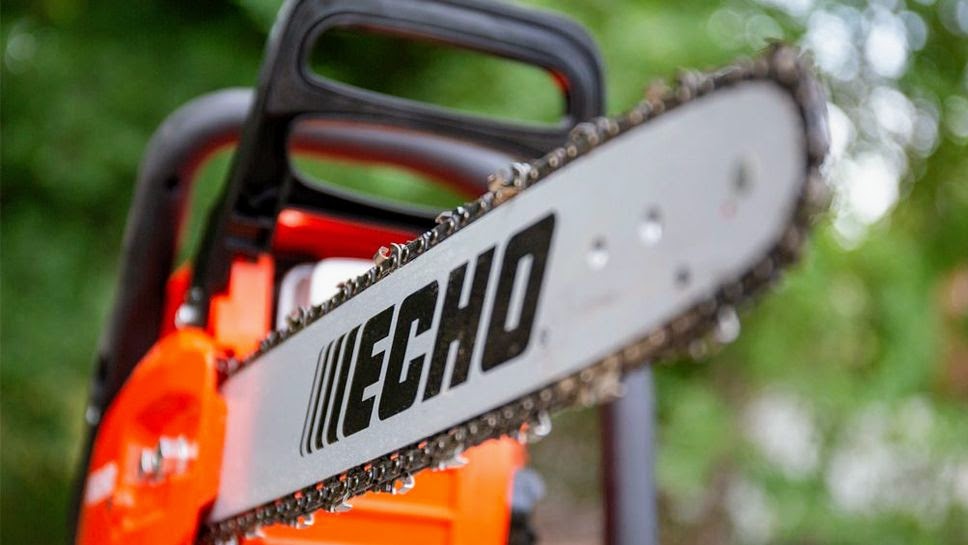
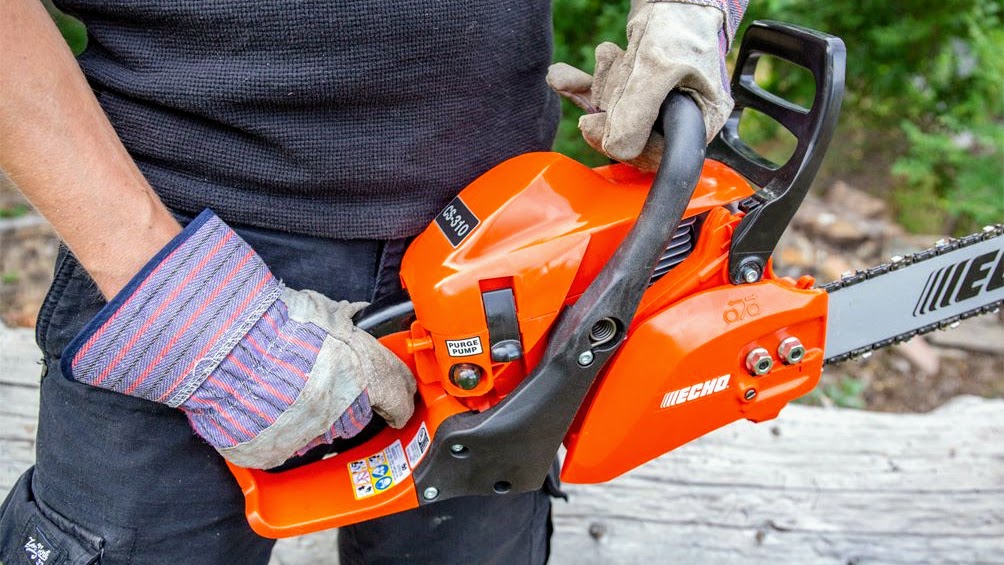
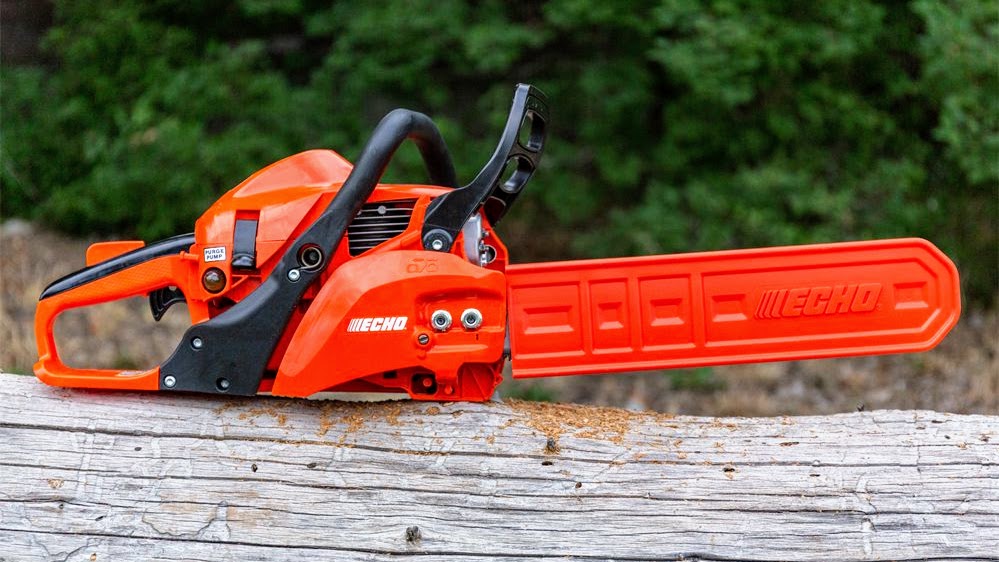
Specifications
Reasons to buy
Reasons to avoid
The Echo CS-310-14 chainsaw is lightweight and starts quickly, making it perfect for professionals, power tool enthusiasts, and rural homeowners. With a well-positioned primer bulb, testers noted it was easier to use than similar Husqvarna models. You can prime without holding the trigger, which makes it super easy to use.
While its 30.1 cc engine offers solid performance, our reviewer, J.D., found its cutting power a little underwhelming compared to the 30.5 cc Stihl and 38.2 cc Husqvarna models. Starting took about four pulls on average, which is decent, but not the fastest among competitors—Husqvarna started in three pulls, while Poulan Pro took seven pulls.
Despite generating 90 decibels of noise, the Echo chainsaw averages under five seconds for cuts through tough materials, so you'll need hearing protection when using it. It's easy to handle, weighing just 8 pounds, but some users say it might bend under a lot of stress.
During tests, it cleared an overgrown yard and even cut through a cherry tree stump, outperforming several corded models. Echo chainsaws may not be as good for casual gardeners or frequent users as they are for professionals. You can get repairs and parts from home improvement stores and dealers, so maintenance is easy. It comes with an owner's manual and engine oil, but you'll need to buy chains and sharpening tools separately. Thankfully, it has a five-year warranty.
Read more: Echo CS-310-14 review

"The Echo CS-310-14 is light and starts quickly, making it a suitable chainsaw for professionals, power tool lovers, and rural homeowners. It’s easy to start, handles well, provides the power to cut through thick wood, and it’s easy to find service centers for regular maintenance."
| Attributes | Notes | Rating |
|---|---|---|
| Features | It's marginally weaker than other chainsaws on this list but it delivers enough muscle to cut through wood quickly and smoothly. | ★★★★ |
| Performance | This chainsaw coped well with clearing a garden of hard cherry tree stumps and overgrown bushes. | ★★★★ |
| Value | This is one of the best chainsaws but it may be overkill if you’re not a regular user. | ★★★★ |
The best lightweight chainsaw
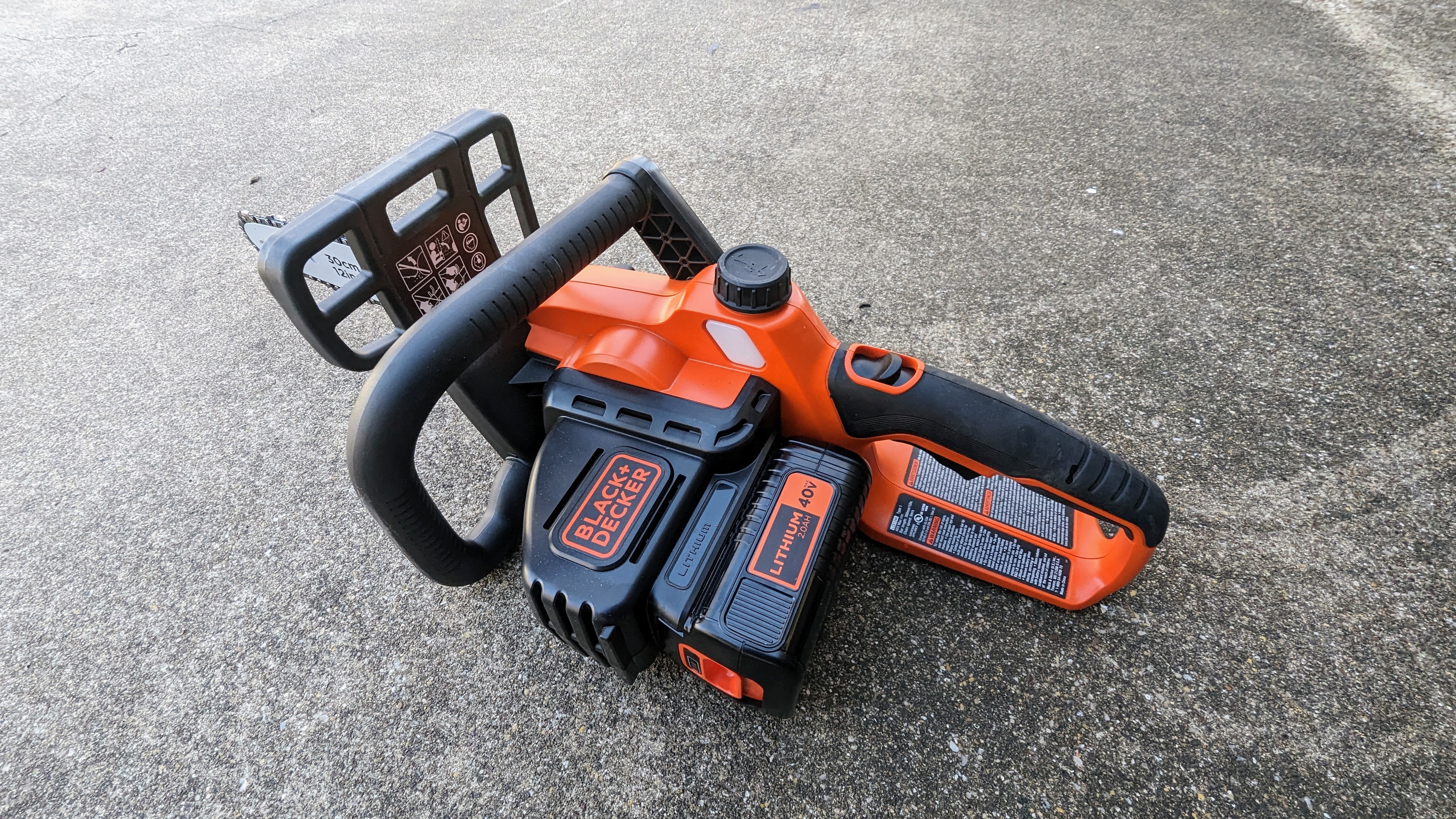
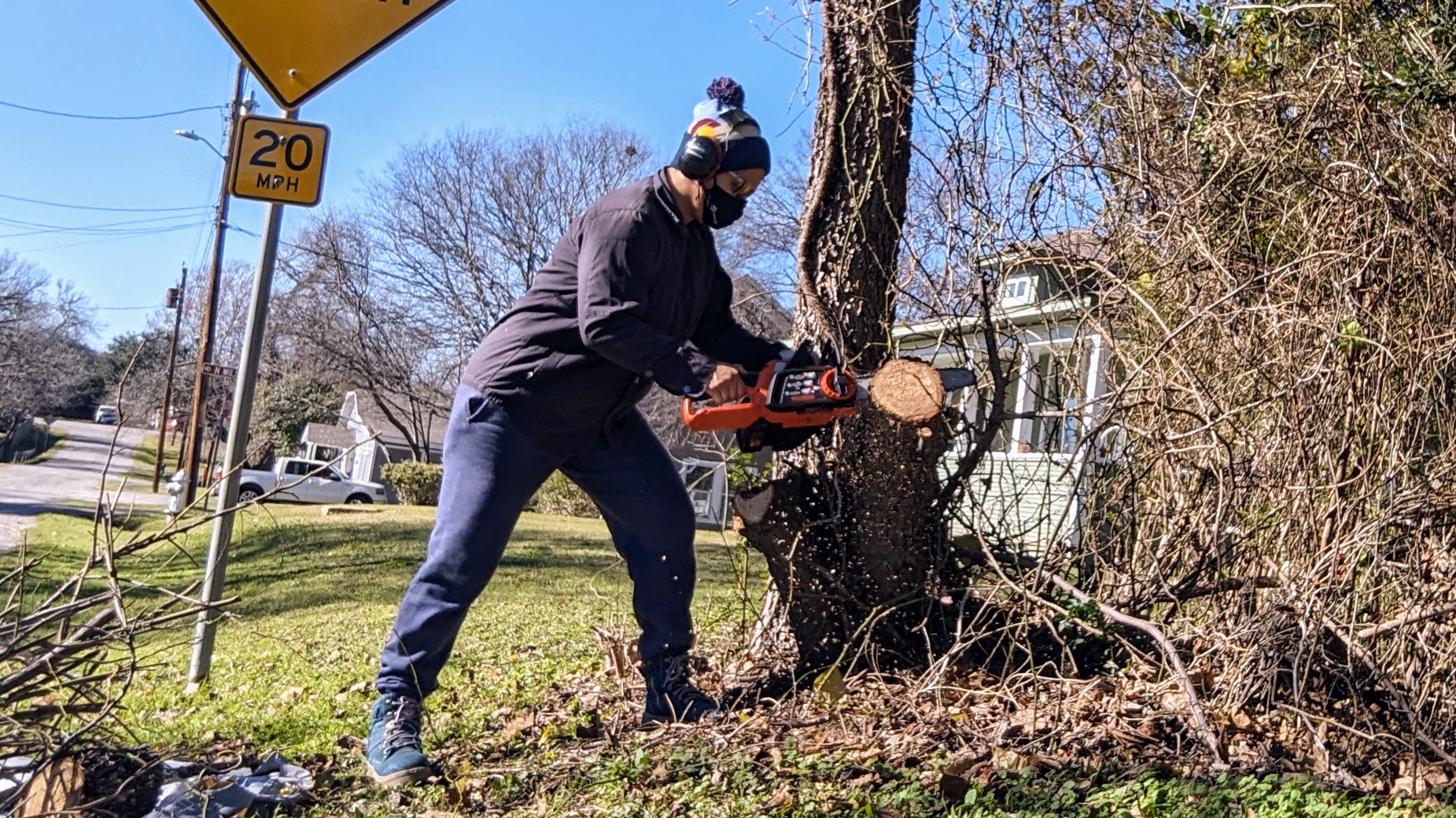
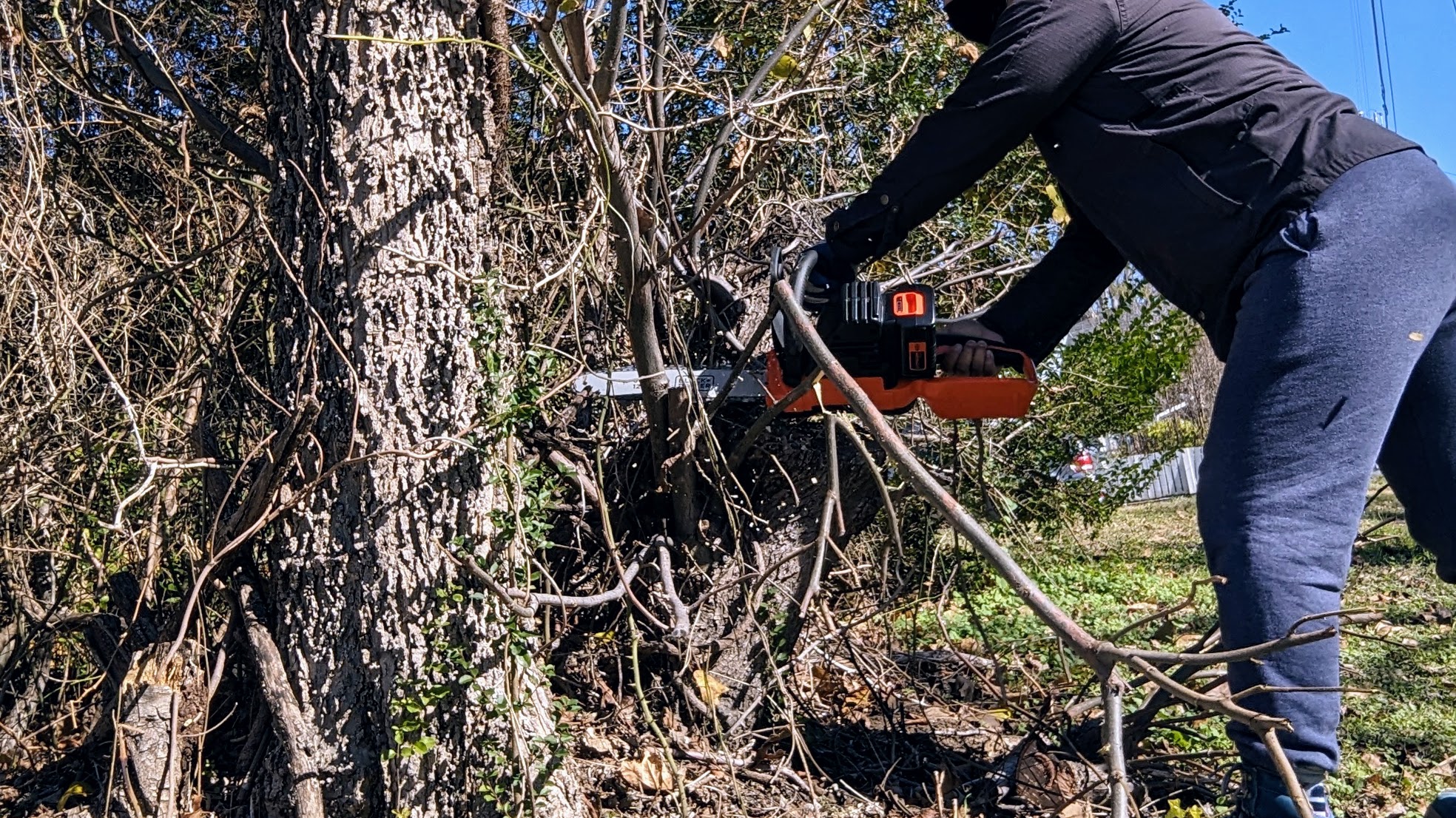
Specifications
Reasons to buy
Reasons to avoid
The BLACK + DECKER 40V MAX 12-inch Cordless Chainsaw is a well-made, lightweight tool that's easy to handle. It can cut pretty slowly, but the results are nice and smooth. You can use this chainsaw for trees and limbs less than a foot in diameter. It's got good safety features and a good battery, so it's a good buy overall.
After charging the battery for about four hours, I appreciated the compact design, which made the bar seem longer than expected for a 12-inch chainsaw.
With an orange and black aesthetic, the chainsaw's bar is lightweight. Storage is easy with a removable cover. On one side, the battery sits, and the tension tool for the chain is conveniently located on the other, so it's easy to tighten. A filtering basket slows down oil pouring into the oil container, so it's smaller than some competitors. The two-handle system enhances safety, requiring both a trigger and a top button to start the chainsaw, and a chain brake activates during kickback—but it can't be manually engaged. For left-handed people, the wraparound handle might feel awkward.
I put the chainsaw to the test in my yard, where I dealt with brush and trees. While it handled smaller branches with ease, it struggled with thicker, 8-inch limbs, which took a bit more effort than expected. Overall, the BLACK + DECKER 40V MAX chainsaw does pretty well. The design makes it a good choice for beginners, even if it's not the fastest.
Read more: BLACK + DECKER 40V Max 12-inch Cordless Chainsaw review

The BLACK + DECKER 40V MAX 12-inch Cordless Chainsaw is a good-quality chainsaw that’s lightweight and easy to handle. It may cut a little slowly, but at least the cut is efficient and smooth. If you’re looking for a chainsaw on the smaller side that can handle trees and limbs less than a foot in width, this chainsaw is a good choice. You'll be satisfied with your purchase, which has some quality safety features and a battery that lasts fairly long.
| Attributes | Notes | Rating |
|---|---|---|
| Features | Small and compact, with good safety features but the battery takes a while to recharge. | ★★★★ |
| Performance | Needs some assistance and cuts slowly but steadily. | ★★★ |
| Value | An affordable choice, even if it lacks some power. | ★★★★ |
The best beginner chainsaw
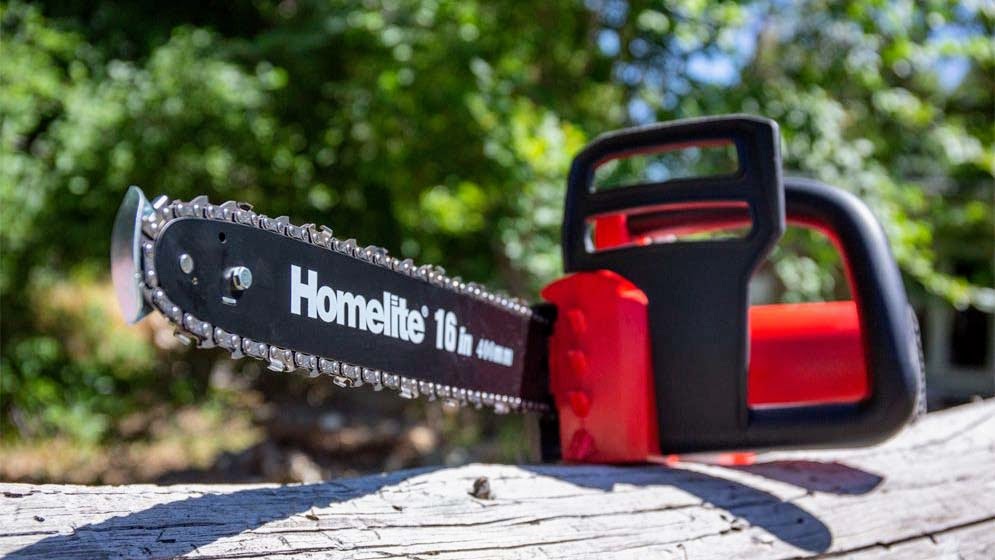
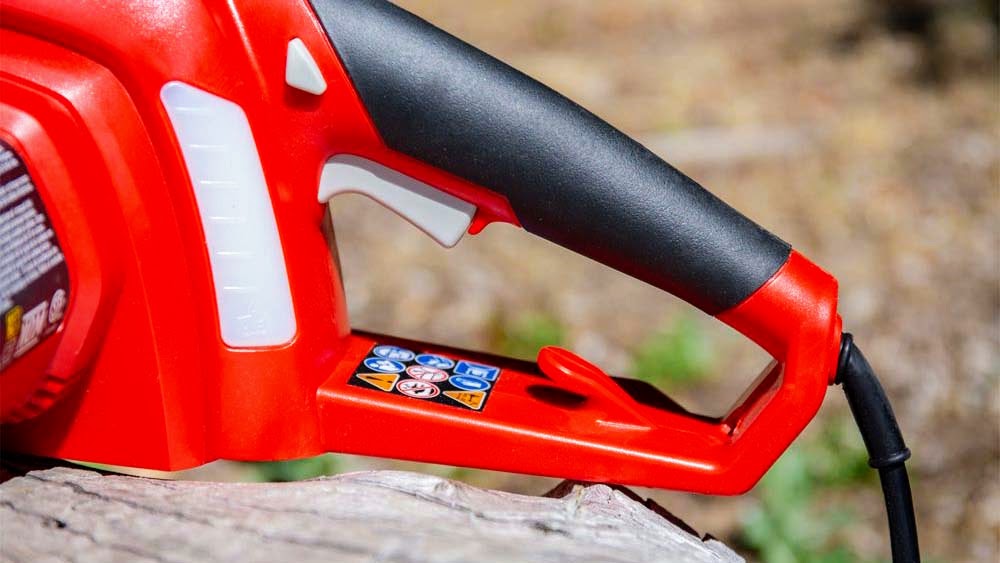
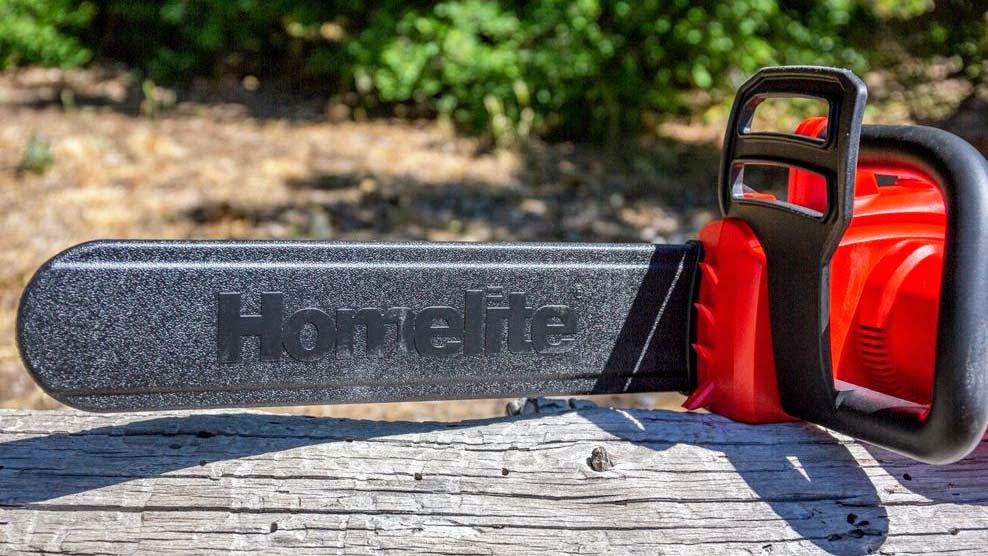
Specifications
Reasons to buy
Reasons to avoid
While it's good for light jobs, the Homelite UT43122B isn't designed for heavy-duty use, as it struggles with thick wood.
Its guide bar is 16 inches, the second longest in our testing. It's ideal for pruning tree branches, clearing overgrown vegetation, or cutting down small—to medium-sized trees. Craftsman 34120 and Worx WG304.1, on the other hand, have 18-inch guide bars, so they may do better with larger jobs.
You can set up the chainsaw in about 10 minutes after unpacking, assembling, and starting it. It's one of the best things about the Homelite chainsaw. It's easy to use, and all you have to do is plug it in, fill it up, and get started. You don't have to worry about fuel mixtures or recoil cords, so it's hassle-free. Cleaning and storing it is also easy. When comparing battery, gas, and corded chainsaws, these benefits aren't unique to this model.
Our reviewer, J.D., compared this electric chainsaw to others by cutting a 6x6-inch piece of lumber. It cut in 16 seconds, but it didn't compare to the gas models, which took under 10 seconds to cut. In addition, two of the three other corded models he tested did the same job a few seconds faster. Overall, the Homelite proved satisfactory for keeping an unkempt yard, but it didn't stand out.
Read more: Homelite UT43122B review

"The Homelite UT43122B is a low-priced chainsaw that is good for keeping around the house for small jobs around the yard. However, it is slow for thick lumber, so it won't be appropriate for larger jobs or as a work saw."
| Attributes | Notes | Rating |
|---|---|---|
| Features | The Homelite UT43122B is a lightweight, easy-to-use electric chainsaw with enough grunt to manage domestic jobs, but has limitations in terms of its corded design and power. | ★★★ |
| Performance | This chainsaw is perfect for general yard work, but you will need a more powerful gas saw for anything more serious | ★★★ |
| Value | The Homelite UT43122B is an excellent, affordable entry-level chainsaw for the novice user | ★★★★★ |
More chainsaws that didn't make this guide
- WORX WG303.1 16 in. 14.5 Amp Electric Chainsaw: Worx WG304.1 is a quiet electric chainsaw that cuts through shrubs and fallen limbs in your yard. We found nothing to stop you from buying it.
- Poulan Pro PP4218 42-cc 2-cycle 18-in Gas Chainsaw: It's a powerful chainsaw if you want something professional.
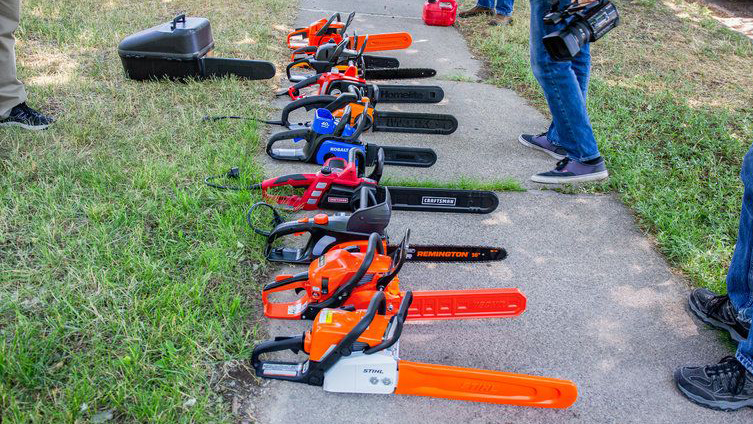
How to choose the best chainsaw for you
Choosing the right chainsaw for your needs requires considering several factors to ensure it meets your needs.
Power Source and Application
Gas-powered chainsaws are great for heavy-duty jobs like cutting down large trees. They're mobile and powerful, so they're great for heavy-duty work. The cordless electric chainsaw is also easy to handle, produces less vibration, and operates quietly, so it's perfect for pruning and cutting smaller limbs. You can use corded electric chainsaws for tasks near a power source, and they're usually lighter and easier to maintain.
Bar Length and Cutting Capacity
The length of the chainsaw bar directly affects its cutting capacity. Longer bars are good for larger trees and heavier cutting tasks, while shorter bars provide better maneuverability and are great for smaller projects. You can find out what kind of bar size you need by assessing the size of the trees and branches you will cut.
Weight and Ergonomics
Considering a chainsaw's weight and ergonomics can make it easier to use. Heavy chainsaws are good for demanding tasks, but they can also make you tired after a while. To ensure your comfort and safety, you need to look at its balance, grip, and vibration levels.
Safety Features and Maintenance
To improve user safety, look for chainsaws with kickback protection, chain brakes, and anti-vibration systems. To ensure your chainsaw's longevity and optimal performance, consider how easy it is to maintain, including chain tensioning, bar lubrication, and overall maintenance.
Environmental Considerations
For environmentally-conscious individuals, it's important to assess a chainsaw's emissions, noise level, and overall eco-friendliness. Chainsaws powered by batteries or electricity are known for their low emissions and noise, so they're great for environmentally sensitive places.
We asked tool expert William Byrne what's important to consider when choosing a chainsaw. This is what he had to say.

William Byrne is an accomplished tool buyer at ADA Fastfix, ensuring a diverse and high-quality inventory of construction tools and equipment. Outside of work, William enjoys woodworking and hiking. He firmly believes that a hands-on approach and staying connected with the end-users of the products he procures are critical for his success as a tool buyer.
"Determine the primary tasks you will use the chainsaw for, such as trimming, felling, or cutting firewood. This will help you narrow down the suitable options. Chainsaws come in various power levels, measured in horsepower (HP) or cc (cubic centimeters) for petrol-powered models and volts (V) for electric models. The power required depends on the intended use and the size of the wood you plan to cut.
"Choose a chainsaw that you can comfortably handle for an extended period. Lighter chainsaws are easier to maneuver but may be less powerful, while heavier chainsaws may offer more power but be more challenging to handle.
"The chainsaw bar's length determines the material size you can cut. A longer bar can handle larger logs, while a shorter bar offers better maneuverability and control.
"Chainsaws are powered by gas, electricity, or batteries. Gas-powered chainsaws are more powerful and suitable for heavy-duty tasks. In contrast, electric and battery-powered chainsaws are quieter, lighter, and more environmentally friendly but may lack the power needed for larger jobs.
"Look for chainsaws with safety features such as a chain brake, anti-vibration system, and low-kickback chain to minimize the risk of accidents. Consider the maintenance requirements of different chainsaw types. Gas-powered chainsaws require more frequent maintenance (oil changes, air filter cleaning, etc.) than electric or battery-powered models.
"Set a budget for your chainsaw purchase and choose a model that offers the best balance of features and affordability within your price range. Research and compare the reliability, durability, and customer support of various chainsaw brands before making a decision."
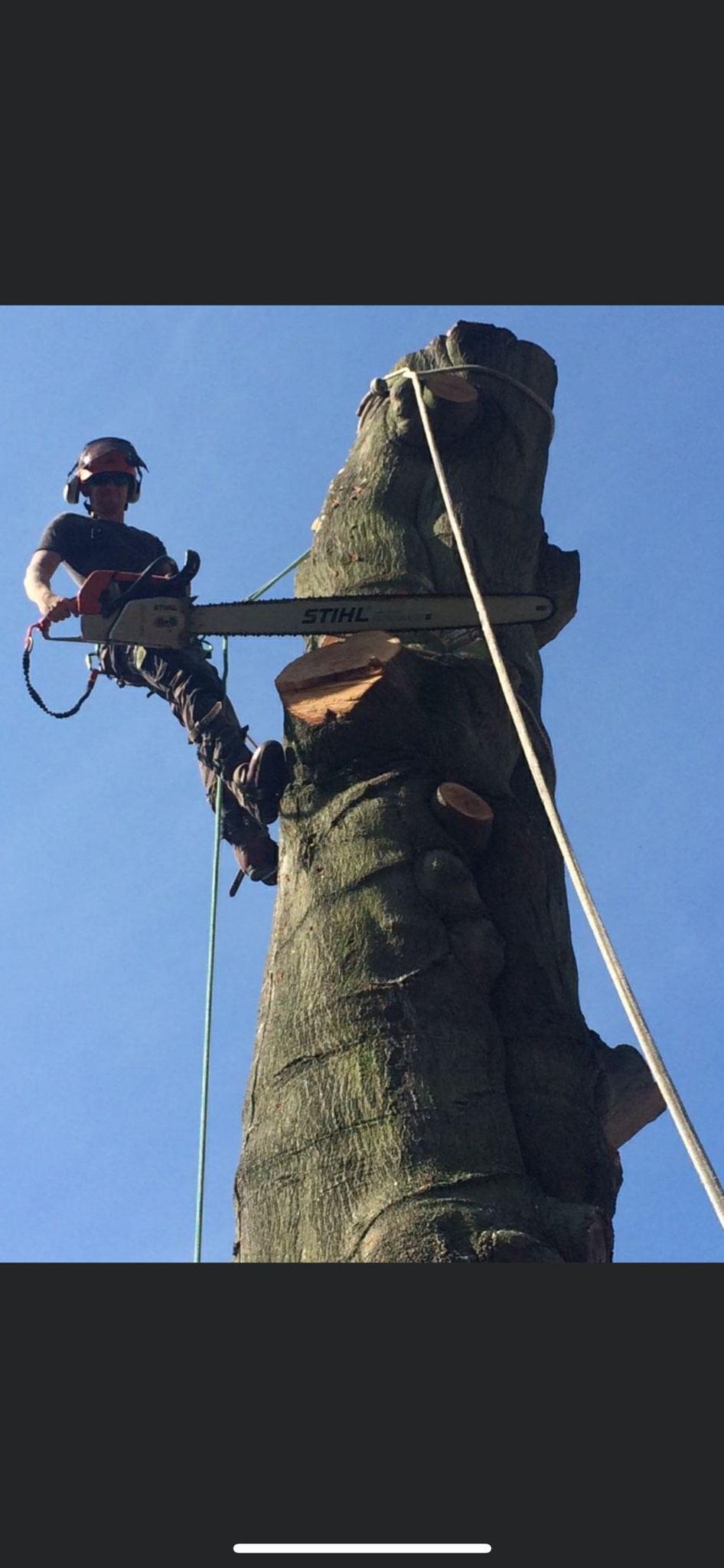
Arborist Joe Hardaker has amassed over a decade’s tree work experience in England, Jersey, New Zealand and Australia. He holds multiple academic qualifications in arboriculture (ND Arb, FdSc Arb, BSc Hort), and is Director and Proprietor of J H Arboriculture, which serves clients throughout Leeds, York and surrounding areas in the north of England.
“Chainsaws are a potentially dangerous tool and should be respected," Joe Hardaker, Arborist at J H Arboriculture, told Top Ten Reviews.
“Beginners should opt for a small, light saw that they feel comfortable holding and they feel that they could easily control. There are different grades: professional, semi-pro, or homeowner,” he said.
“If you're an arborist or forester and you'll be using your chainsaw daily, you'll need a professional grade saw as these are better built but come with a hefty price tag. Occasional use buyers can afford to choose from the lower end of the market.”
“The two big names, Stihl and Husqvarna, make exceptional saws from homeowner to professional grade,” Joe continued. "However, I prefer the lesser-known brands that still make professional-grade saws. Makita, Echo, and Jonsered make fantastic saws and tend to be a little cheaper.”
Chainsaw FAQs
How do chainsaws work?
Understanding how chainsaws work involves looking at their key components and the mechanics behind how they work.
Engine: A chainsaw can be powered by a gasoline engine or electric motor. Gasoline engines provide more power, making them better for heavy-duty jobs, while electric motors are quieter and require less maintenance, making them better for lighter jobs.
Chain: Each tooth on the cutting chain is designed to slice through wood fibers, and its sharpness and configuration determine how well it cuts.
Guide Bar: The guide bar is the long, flat surface where the chain runs. Longer bars cut through thicker logs better.
Drive Mechanism: As the engine runs, the drive sprocket rotates, causing the chain to move around the guide bar.
The user typically follows these steps to operate a chainsaw:
Start the Chainsaw: Gas chainsaws must be primed, choked, and started. Electric chainsaws just need to be plugged in.
Engage the Chain: With the throttle engaged, the chain moves rapidly around the guide bar, ready for cutting.
Cutting: The chainsaw's teeth grip and cut through the wood fibers when the user applies downward pressure.
Safety Features: Modern chainsaws have safety features such as chain brakes, which stop the chain if it kicks back, and anti-vibration systems.
What are the different types of chainsaw?
You can choose the right chainsaw for your needs by understanding the different types of chainsaws.
Gas-Powered Chainsaws: The most powerful chainsaws are gas-powered, perfect for felling trees or cutting thick logs. Because of their portability and high performance, they're favored by professionals and serious homeowners. They need regular maintenance, including fueling and oiling.
Electric Chainsaws: Two kinds of electric chainsaws are available: corded and battery-operated. The corded electric chainsaw is lightweight and perfect for pruning and cutting small trees. It provides consistent power but needs an outlet nearby. Battery-operated models are ideal if you're in the yard for a quick job. Their runtime is limited by the battery, though.
Pole Chainsaws: Chainsaws with poles are designed to reach high branches without a ladder. They're lightweight, easy to maneuver, and perfect for trimming trees and shrubs.
Mini Chainsaws are portable, lightweight, easy to handle, and often battery-powered, making them perfect for small jobs like trimming and pruning.
Professional Chainsaws: The heavy-duty models come with bigger bars and more powerful engines. They are made for logging and landscaping.
Specialty Chainsaws: Chainsaws designed for specific tasks, like cutting concrete or ice, often feature unique features.
What safety features should I look for in a chainsaw?
Choosing the right chainsaw involves considering safety features that can help safeguard you and those around you while using it.
Chain Brake: A chain brake is essential for safety. It can stop the chain almost instantly in the event of a kickback, which could lead to serious injury. Always choose a chainsaw with a reliable and easily accessible chain brake.
Low Kickback Chain: Chainsaws with low kickback chains enhance overall safety and significantly reduce the risk of kickback, which occurs when the saw unexpectedly jerks back toward the operator.
Hand Guards: You'll want a chainsaw with sturdy, well-designed hand guards that offer adequate coverage while allowing you to handle the saw comfortably.
Anti-Vibration System: Chainsaws' anti-vibration systems can help reduce fatigue and discomfort during extended use, improve saw control, and prevent accidents.
Safety Switch: This feature ensures that the chainsaw remains off until the operator intentionally engages it, adding another layer of safety.
Reviews
Echo eForce DPB-2500 review: a leaf blower as a snow removal tool?
Opinel Hand Pruning Shears review: are these the world’s most stylish secateurs?
STIHL HSA 60 Hedge Trimmer review: a battery-powered hedge trimmer that "gets the job done"
STIHL FSA 200 R String Trimmer review: quirky yet powerful, efficient and battery-powered
Husqvarna Combi Switch 330iK review: A versatile, all-in-one lawn tool
ENHULK 58V 16” String Trimmer review
Husqvarna Hedge Master 320iHD60 review: a cordless hedge trimmer on a mission to master hedges
Proper Weight Distribution: A chainsaw with balanced weight distribution is easier to control and less likely to cause accidents. Choose ones that feel comfortable and manageable.
How much do chainsaws cost?
Consumers can choose chainsaws based on their specific needs and budgets, ranging from $50 for mini models to over $600 for high-end gas-powered models.
Due to their power and durability, gas chainsaws tend to be more expensive. Husqvarna and Stihl are high-end brands that fall into this price range, and their robust features make them perfect for professional use.
Corded chainsaws cost between $80 and $200 and are perfect for trimming and pruning. Electric chainsaws with batteries tend to be a little more expensive, usually between $150 and $300, depending on the battery capacity and features. A mini chainsaw is great for small jobs like pruning and trimming. They typically start around $50 and can go up to $150 for more advanced models with additional features.
When budgeting for a chainsaw, consider additional costs, like chains, maintenance, and safety gear. Chains can cost $10 to $50, and regular maintenance can get expensive.
How long do chainsaws last?
A chainsaw's lifespan can be anywhere from 3 to over 10 years, depending on the type, usage frequency, maintenance, and overall quality.
A gas chainsaw usually lasts longer than an electric chainsaw. With proper care, a gas chainsaw can last 5 to 10 years. Electric chainsaws, especially battery-operated ones, usually last about 3 to 5 years due to the wear on batteries and motors.
A chainsaw can last decades if it's properly maintained for occasional users. The amount of use plays a big role in its longevity. As a result of the extra wear and tear, professionals or people who use chainsaws a lot may have a shorter lifespan of 3 to 5 years.
Regular maintenance is crucial if you want your chainsaw to last longer. Sharpen the chain, clean the air filter, and make sure the fuel and oil mixture is right. Neglecting maintenance will lead to premature wear and failure. Well-maintained chainsaws can last a lot longer than ones that aren't.
The brand and quality of the chainsaw also impact its lifespan. Usually, higher-end chainsaws are made with better materials and construction techniques, so they last longer. On the other hand, cheaper ones might not last long, so they'd fail sooner.
Are there any eco-friendly chainsaw options available?
For environmentally conscious users, learning about chainsaws that minimize emissions or use sustainable power sources is essential. Consumers are becoming more aware of the environment, which is why they are looking for chainsaws with a smaller carbon footprint. There are several alternatives to gas chainsaws that don't lead to air pollution and carbon emissions.
Electric Chainsaws: Unlike traditional lead-acid batteries, electric chainsaws produce no emissions during operation. Corded models are great for light to medium tasks, but battery-operated versions are more portable. Lithium-ion batteries are more efficient and have a lower environmental impact than traditional lead-acid batteries.
Battery-Powered Chainsaws: Homeowners and gardeners especially like battery-powered chainsaws. In addition to being quieter than gas models, many brands now offer battery-operated chainsaws that can handle all kinds of cutting jobs. You'll last longer with a quality battery chainsaw and you'll need to replace it less often.
Low-Emission Gas Chainsaws: Manufacturers commonly make low-emission gas chainsaws that meet strict environmental regulations. These models use advanced engine technology to be more fuel efficient while minimizing pollutants. They're designed to reduce emissions significantly.
Sustainable Manufacturing Practices: When looking for eco-friendly chainsaws, choose chains that prioritize sustainable manufacturing practices. Some companies use recycled materials, adopt environmentally responsible production processes, and recycle old tools to contribute to a circular economy.
When is the best time to buy a chainsaw?
Generally, the best time to get a chainsaw deal is late winter to early spring, during sales events, or when retailers are clearing inventory.
It is best to buy a chainsaw in the winter or early spring before gardening and landscaping start. During these months, you can find a wider selection and potentially better deals because retailers usually stock up on outdoor tools and equipment. Spring cleaning and yard work can also drive sales for consumers.
Chainsaws are a great deal during major sales events like Black Friday, Labor Day, and Memorial Day. If you look for promotional events, you can save a lot on outdoor power equipment during these holidays, especially on higher-end models.
To make room for winter products, many retailers clear out their inventory as summer turns into fall. In the late summer or early fall, you can save a lot on chainsaws, especially electric ones, since they're less popular in winter.
How we tested the best chainsaws for this guide
We like to be through with our testing here at Top Ten Reviews, and we're on a mission to ensure that all the products featured in our buyer's guide have been vetted and reviewed by one of our experts.
When reviewing chainsaws, we assess everything that you could need and want to know over a few weeks. From setting up the chainsaw to trying it out on trunks and branches, we're here to share with you our honest end-to-end experience using them so you can make an informed purchase decision.
I'm proud to say that all the chainsaws featured in this buyers' guide have undergone some hands-on testing. We'll continue to call in popular and new chainsaws to keep this guide up-to-date and ensure that you really are getting the "best" for your money.
Find out more about how we test.
Meet the team

Alex Temblador is a sought-after Dallas-based writer and author with a focus on home, design, and technology. Her work has been featured in numerous reputable publications, and she recently purchased her first home, a historic Sears & Roebuck house with charming features such as a wraparound porch and original hardwood floors. In addition to her writing, Alex enjoys testing and reviewing products for leading publications, including chainsaws for Top Ten Reviews, Tech Radar, and Tom’s Guide, all while settling into her new homeowner life with enthusiasm and curiosity.

Jason has been testing and reviewing products for over ten years and has plenty of experience with outdoor power equipment. He never frees away from a good day of yard work and enjoys getting his hands dirty. He used the MSA 300 C to clear away several large branches and a small tree that fell in his yard after a bad storm and to clear away one eight-to-ten-inch-diameter tree in his backyard. Aside from Top Ten Reviews, you can also find Jason's product reviews on CrackBerry, Android Police, CNET, XDA, and more.

Having tested plenty of chainsaws for TopTenReviews, J.D. Chadwick is the resident expert on chopping wood. The models were put through the same battery of tests as each other.
Sign up to receive the latest news, reviews, buying guides and deals direct to your inbox

Alex Temblador is a Dallas-based award-winning author and freelance writer. She covers home, design, architecture, and art for various publications. Recently, she purchased her first home, a historic Sears & Roebuck house with original features. Alex also enjoys testing yard tools and vacuums for buying guides and reviews.
